#of the tour dates/cities only dublin appeals so.
Explore tagged Tumblr posts
Text
i was so so SO sure rammstein wasn't gonna tour next yr but. guess what. :')
#2 yrs of touring plus theyre like. older. and have families. 100% thought theyd take a break......#of the tour dates/cities only dublin appeals so.#guess its time 2 start looking at the feasibility of goin 2 ireland next year#not that i like. HAVE to go see them everytime they tour. its not like im not going 2 places i wouldn't wanna go anyways lol#but goddamn is airfare only getting more and more expensive#cursory search on expedia and its lookin like it might actually cost more than my helsinki airfare this year did.... bonkers#but yh. ireland isnt like at the VERY top of my list of Places I Wanna Go but eh its up there /shrug#really do wanna go back 2 wales one day tho......
1 note
·
View note
Text
Most Popular Things to do in Dublin.

Book cheap flight tickets to Dublin; one of Europe’s ancient metropolises, it’s a lively city center packed with appeal and culture. Here are the top things to do and view.
Dublin is renowned for welcoming natives, energetic music, and, nowadays, a tasty foodie section. You’ll understand why wherever you wonder, from Temple Bar to the Creative Quarter, but be certain not to miss these must-dos. They’re Dublin originals you just couldn’t encounter anywhere else.
Visit the Guinness Storehouse.
The adored ‘pint of black stuff’ is anything but normal. The stout has scattered Dublin’s reputation all over the world, and you could see where it all started at the Guinness Storehouse. The Guinness tale is a typical Irish journey uplifted by radiant personalities and the brand’s emblematic publicizing.
Obviously, after submerging yourself in all things Guinness, you’ll need to taste a pint. It’s a prevailing discussion which of Dublin’s pubs offer the best pint of Guinness, but nowadays that label is extremely competed by the brewery’s personal Gravity Bar, and the 360-degree rooftop sight might be the metropolis’s best too. You could organize your following escapade from here since you’ll have to travel on ultimately. Visitors are restricted to only one complimentary pint – or else it’s likely that nobody will ever depart.
Trinity College Long Room and Book of Kells.
Walking Trinity College’s excavated greens and patios could seem a little like going back in time. This traditional seat of education was established during 1592 and wears its age extremely well really. Currently, Trinity is residence to some of the top and brilliant young minds, respecting a custom of scholars such as Edmund Burke and Oscar Wilde.
During the 18th-century Old Library, you’ll discover the Long Room, certainly one of the world’s most remarkable library chambers, and a few of Ireland’s most valued artifacts. The wooden harp here, dating from about the 15th century, has turned into an emblem of Ireland spotted everywhere from the Guinness logo to Irish coins. One of the less surviving copies of the 1916 Proclamation of the Irish Republic could also be viewed here.
But the Book of Kells, possibly the most popular old-fashioned document in Europe, is in a class by itself. The ninth-century handwritten copy of the Gospels is extravagantly exemplified, unique, and a complete must-see for all Dublin tourists.
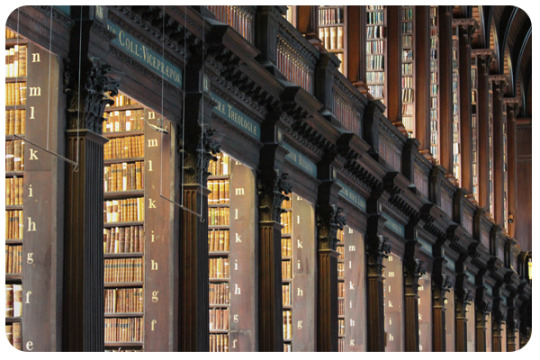
Little Museum of Dublin.
Dublin is a historic metropolis but the lives and lifestyle of its more current inhabitants are every bit as captivating as its Viking history. There’s no more pleasant location to tour them than the Little Museum of Dublin. As suits a peoples’ museum, the assortment is situated in a Georgian townhouse that’s pleasantly packed with relics, tales, and displays of 20th– century life in the metropolis.
Don’t miss the museum’s complimentary City of a Thousand Welcomes scheme. Sign up and you’ll be matched with a Dubliner who would take you out for a cup of tea or a pint and offer you an opportunity to see the metropolis via the eyes of a native.
Dublin Castle and the Chester Beatty Library.
Dublin Castle is an old Viking fortress, a traditional seat utilised by Ireland’s current government, and a lively hub for community displays and events. These appeals all sum up to one must-see visit for Dublin tourists. Investigate below the castle to tour unique ditches and defenses, then surface to walk the magnificent gardens overhead.
Examine the calendar to observe what’s on in your tour. But don’t miss one lasting appeal: From 2000 the castle has accommodated the Chester Beatty Library, an assortment of books, documents, and art from all over the world so exceptional it was named European Museum of the Year.


EPIC The Irish Emigration Museum.
The Irish story doesn’t finish at the Emerald Isle’s coasts. Several millions of Irish have migrated and, in the course, redesigned other states all over the world with their distinctive attendance. This cooperating museum in Dublin’s Docklands surveying the whys, hows, and wows of 10 million heroic trips.
If you’re one of the world’s 70 million people declaring Irish lineage, the engaging, hands-on displays would link you with your origins and the various branches they’ve strewn all over the world. There’s even an expert genealogy service on-location. Never fear non-Irish, you’ll still relish reveling Ireland’s lasting cultural effect on the globe. It’s merely too great of a story to miss.
St. Stephen’s Green Park.
A green gem in the center of Dublin, St. Stephen’s Green is the ideal location to stop and whiff the flowers. After all, people have been doing so often in the past 400 years. Currently, the park preserves many of the Victorian patterns features custom-built by Sir Arthur Guinness, who renovated the fleetingly private green and restored it to the citizens of Dublin during 1880.
Hundreds of ripe trees cover the area from the encircling metropolis, and paths inspect flower beds, statues, a bog garden, and a delightful lake preferred by waterfowl and fish. Get a complimentary audio guide to discover more about the lengthy past and contemporary appeals of the green and get ready to unwind here like Dubliners do.

Read More:- Most Popular Things to do in Dublin.
This Article, Information & Images Source (copyright):- Travel Center UK Blog
#travel#travelcenteruk#travelblog#travelblogger#travelvibes#Holidaymakers#destinations#traveller#travelling#dublin
2 notes
·
View notes
Text
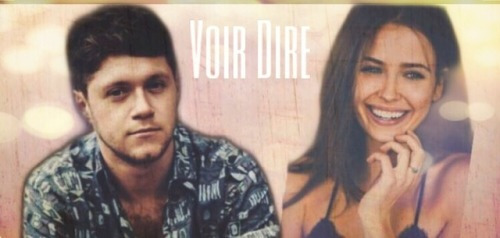
Voir Dire (N.H.): A fake dating OU about contracts, soulmates, and risking it all for love
four
five
Kelsey woke up in an unfamiliar bed. The white cotton sheets and plush comforter that touched her bare skin were far too soft to be the bargain threads in her apartment. The room was far too spotless to be hers and the framed black and white Eagles tour poster that was directly in her line of view certainly didn't belong in her apartment either. It was only when she sensed the presence of the sleeping body next to her that the events of last night came rushing back to her.
The club. The lights. The cab ride to Niall's house. Fast kisses and slow hands. A euphoria she hadn't felt for a long time.
But in the the wake of morning, Kelsey realized the insanity of it all. This was completely out of character for her. She barely knew Niall, and she surely didn't want him to think that she was emotionally available- she clearly wasn't. Last night had been fun, and that was all it needed to be. Nothing more.
Kelsey knew she needed to leave before he awoke and she could realize the mistake that she had made.
She grasped the closest thing she could find to cover her naked body- a black hoodie folded neatly on a black chaise in the corner of the bedroom. Kelsey yanked it over her head before frantically trying to search the room for her lost belongings. She followed a trail of various garments strewn across the dark hardwood floors out into the living room, reaching down to pick up her jeans from the foot of the couch when Niall's voice startled her.
"Making a run for it this morning?"
Kelsey turned around slowly. Niall was leaning against his bedroom doorway in only his black Calvin Klein boxer briefs, looking just as intriguing as he had last night. Kelsey averted her eyes, trying to focus on the doorframe behind him instead of the half-naked man in front of her. The last thing she needed to be doing was thinking about Niall in that way. She was just seeing herself out.
"Figured it was for the best," Kelsey replied quickly. In all honesty it was a bit of self-defense. Kelsey didn't want to be the one kicked out of the celebrity dream house, she'd take things into her own hands.
"I don't usually uh...do this with girls. I mean..." Niall stammered, his brain unable to form a coherent sentence.
Kelsey's face turned into a questioning smile.
Niall quickly corrected himself. "I mean I do this with girls, but not like this," he sighed throwing his hands up in the air at his inability to express his thoughts. "I guess what I'm trying to say is I usually like to take a girl to dinner first."
Kelsey found her self stifling a laugh. "No dinner needed," she fiddled with the jeans that were now in her arms. "But I should probably get going."
"At least let me make you some breakfast before you leave?" Niall pleaded, forming his lips into a pout. He felt like he had to do something to convince himself that it wasn't just a One Night Stand- even if in reality that was what it was.
Kelsey smiled. "I guess breakfast wouldn't hurt." Kelsey figured at this point the damage was already done, it wouldn't hurt to spend a little longer living out the fantasy of countless fangirls.
"If you'd like, you can take a quick shower. Bathroom's just off the master. Should be some clean towels hanging up," Niall gestured into the bedroom they both emerged from. "I'll get some food going."
Niall left his perch on the door frame to head towards the kitchen, leaving Kelsey to pick up her remaining articles of clothing. It crossed her mind for a moment to make her escape right then, but she couldn't do that to Niall. He had been so nice to her, and besides, she rather enjoyed his company.
Kelsey walked into the bathroom and turned on the shower, letting the steam from the hot water begin to fill the room. She stared at her face in the mirror, noticing a glow that she hadn't seen for quite some time. Even her brown eyes, seemed to have more hazel to them than usual.
She stepped into the shower, letting the warm water run over her skin. The warmth reminded her of Niall's touch, and she shuddered as her mind flashes back to last night. Kelsey pushed the thought deep into the darkest corners of her mind. All the instant chemistry in the world couldn't convince her to get romantically involved with someone again, even if that instant chemistry was with Niall Horan.
Meanwhile, Niall found himself humming the tune of his latest single while frying up some eggs and bacon on his stainless steel stovetop. He felt his mood had done a complete 180 from the events of yesterday. Maybe it simply the fact that sleeping with a girl that was not his alleged girlfriend was a big 'fuck you' to his management, but Niall couldn't help but think that maybe it was more.
It had been a long time since he had felt as instantly connected to someone as he did with Kelsey. She was a breath of fresh air really, expressing a genuity that was hard to find in the crowds of Los Angeles. Niall knew that logistically, nothing could ever come of this. But somehow, he still found himself eager to continue the conversation with her and make a good impression on his guest. He only hoped that the connection would continue as easily sans alcohol.
"Smells good," Kelsey startled Niall with her presence in the kitchen. Her now damp hair lay over her shoulders and onto Niall's black hoodie, which Kelsey had pulled over last night's jeans.
"Hope it's okay that I snagged your hoodie for the time being. Going out outfits aren't quite as appealing the next morning," Kelsey slid onto the black barstool and rested her elbows against Niall's white granite kitchen countertop.
"Not a problem," Niall said with a smile, wondering if her scent would linger on his hoodie after she left. He turned back to the stove momentarily to check on the now sizzling bacon.
"Your place is gorgeous by the way," Kelsey added trying to fill the void in conversation. "But I mean, of course it is." Kelsey wished she could retract her words as soon as they leave her mouth. Complimenting him on his house? Was that the best she could do?
"It is. Sometimes I can barely believe I live in it."
"Did you ever imagine your life would end up like this?" Kelsey asked, gazing over at the brunette scrambling eggs.
"Never in a million years."
Kelsey supposed her answer to the question would be the same. Never in a million years would she have imagined a pop star would be cooking her breakfast in his mansion. But then again, never in a million years would she have guessed that she would even been in a city like Los Angeles, not having spoken to her mother in months. Single, working as a bartender, and mostly alone.
"Always thought I would end up being some business man in Dublin who would play guitar at a pub every once and a while to keep himself young," Niall laughed. "Guess that's why I try not to take myself too seriously, I'm living the dream of so many people."
Kelsey nodded. Niall was so different than she ever would have imagined. I mean she never thought he was one of those obnoxious celebrities, but she definitely expected him to be a little less...well normal.
"And how about you Kelsey? Did you always want to come out to LA?" he asked as he places a plate of steaming bacon and eggs in front of Kelsey before taking a seat on the barstool next to her with his own.
"Wasn't exactly my plan," she said with a shrug. Niall can tell that there is probably more to that story than meets the eye. But why would she share that with him, a stranger by most definitions?
"Ehh, who needs plans anyway? What ever happened to just living your life?" Niall's voice became laced with a bit more passion than he intended. He supposed that had something to do with the fact that the plans that now ran his life weren't even his own.
Kelsey laughed. "Wish my type A self could accept that. Unfortunately, I'd rather beat myself up bombing a test I was well prepared for," Kelsey took a bit of her eggs, shaking her head. She wasn't sure why she just shared that piece of information with Niall Horan, but she supposed it wasn't like he could judge. The man likely didn't even have a high school degree.
"Well hey for what it's worth, I'm glad you bombed that test," Niall said with a smile.
Kelsey raised an eyebrow.
Niall laughed. It was a deep, full-bellied laugh. The kind of laugh that makes you want to laugh too. "Because if you had passed the test, I wouldn't have spilled a drink on you last night and well, I wouldn't be eating breakfast with you now."
"Listen Niall..." Kelsey began. She figured she better be the bearer of bad news before Niall got his hopes up that this was going to be some kind of long-term thing. Not that Niall wouldn't be the type of person she would want a long-term thing with, because he was. It was just that, at this point in time, and probably for a while longer, Kelsey wasn't emotionally available enough to commit to any kind of possible relationship. Even if it was with someone that she connected with so quickly.
"I should tell you, last night. Well, last night was really great." Kelsey finds herself smiling thinking back. "The most fun I've had in a long-time actually."
Niall nodded in agreement. "Last night was quite fun, wasn't it?"
"And you are great Niall, you really are. But this thing, well, I'm just not in a place right now to get emotionally involved with anyone," Kelsey paused for a moment hoping she wasn't coming across as too insensitive. "I guess what I'm trying to say is, it's not you it's me? But let's just leave it as a night of fun?" Kelsey lets out a slight uncomfortable laugh, the kind of laugh that is given to fill a void of silence rather than because something was actually funny.
"Oh no, I mean, if I'm honest with ye, you could say I'm not really in a position right now to start anything. It was just a good time," Niall stumbled. "You're great Kelsey, but ya, timing's just not right for us."
"Exactly," Kelsey replied. She was glad Niall seemed to be on the same page.
"But if you ever want to hang or something. Give me a ring," Niall added, picking up Kelsey's phone from the counter and plugging in his number.
"Okay," Kelsey said. She stood up from the counter. "I should probably get back to my apartment, got to hear all about the date," she laughed. "Thanks for breakfast, it was delicious actually."
"You sound surprised," Niall chuckled, grabbing Kelsey's empty plate and placing it in the sink to wash later.
"Didn't know pop stars could cook I guess," Kelsey teased. Gathering up her clothes and purse from the pile on the couch. She gazed down and saw that she's still wearing Niall's sweatshirt.
"Ooops, better give you this back."
"Nah, you can keep it," Niall said. What was one sweatshirt? "Give it back to me some other time if it really bothers ya."
Kelsey nodded in understanding, standing awkwardly holding her clothes in her hands. What was the appropriate goodbye in this type of situation? "Well, I guess I better get going then," she gestured towards the door.
"It was nice to meet you Kelsey," Niall said, wrapping his arms around her in a hug. Kelsey took a deep inhale of his scent, before pulling away and heading out the door.
Niall watched as Kelsey walked out the door. There was something about this girl that wasn't like any of the others. He just wished the timing was right.
**********************************************
"Where were you last night?" Becca exclaimed with a raise of an eyebrow as soon as Kelsey stepped in the apartment door. Becca was seated on the couch, legs up in the air and latest tabloid open upon her chest. Her date nowhere to be seen.
"Jeez can I get in the door?" Kelsey said with a laugh, slipping off her heels before sauntering over to set her purse on the kitchen counter. Becca eyed her as she walked, and Kelsey didn't have to look her way to know her roommate had a lot to say.
"Is that..." Becca began, gesturing to the black hoodie still adorning Kelsey's body. Kelsey looked down at the soft black fabric, she'd nearly forgotten it wasn't her own. She nodded, which triggered a high-pitched squeal to be released from Becca's mouth.
"Oh my god Kels, I can't believe it. You really did it."
"Did what?" Kelsey asked, even though she knew exactly what she had done. It was shocking even to her, the girl that had sworn off the male species. And just as shockingly, Kelsey wasn't regretting it. She felt strangely empowered, like she was reinventing herself.
"You know exactly what," Becca laughed. "You are glowing girl, I haven't seen you this happy since..." Becca stopped her sentence before finishing.
Kelsey didn't need her to finish. That sentence ends with a name. Sam. And that happiness had been a long time ago. That happiness was before Kelsey realized what a lying, cheating scumbag Sam Harris was. Back in the honeymoon phase when Kelsey thought she had found the perfect man.
Kelsey didn't want to hear Becca compare her evening with Niall to her relationship with Sam. Just the mention of her deceitfully perfect former relationship had enough negative thoughts associated with it to ruin anything in its path.
"Sorry," Becca said shyly. "I'm just really glad that you enjoyed yourself. You deserve it you know."
Kelsey smiled. Becca was right, she did deserve to have a night like that on occasion. Something to make her feel like her life wasn't absolutely in shambles, even if only for a few hours.
"So are you going to see him again?" Becca inquired.
"Niall?" Kelsey asked, eliciting an eye roll from Becca.
"No I was asking about the bouncer from last night, yes Niall."
"I don't think so..." Kelsey trailed off. She thought about the contact that now took up a space in her phone, the one that could keep her touch with Niall if she ever so wished.
"Wait don't tell me he's one of those celebrities that takes home a different girl every night, he seemed so normal last night."
"No, no," Kelsey instantly found herself coming to Niall's defense. Even in the short time she had spent with Niall she was certain that he wasn't that kind of guy. No, Kelsey believed Niall to be someone who didn't want to use his fame as an advantage. If anything, he wanted to be seen as just another guy.
"It was more that you know, neither of us were really looking for anything serious," Kelsey explained.
"You mean YOU aren't ready for anything serious," Becca corrected her. Kelsey sighed, while Becca wasn't completely wrong, her departure from Niall's place this morning had shown a mutual understanding of the situation. She'd gotten the vibe that he wasn't exactly available either.
"I may not be ready for it," Kelsey reluctantly admitted. "But we both agreed, the timing is not right...for either of us."
Becca let out an overdramatic groan. Kelsey turned her head to her friend, ready to hear whatever lecture she was about to give. "What now?"
"You do know Kelsey's 'the timing's not right' excuse is like the most bullshit excuse in the world." Becca sat up from the couch leaning towards Kelsey as if she is reading to give her her piece of mind.
"There are only two reasons you use the "timing's not right excuse", the first being you can't bear to admit the true reason things aren't working out and you need to let them down slowly. The other being there is literally no other sane reason you would be stupid enough to let something like that go, so you need some kind of poor justification as to why things aren't working out," Becca paused for dramatic effect.
"And judging by the way you are glowing you definitely aren't using it for the first reason."
Kelsey rolled her eyes at her friend's lecture. "Don't act like you've never used that excuse before."
"I've used it many times. But believe me Kelsey, I've done the timing's not right excuse and I let the love of my life slip from my fingers." Becca stared distantly off into space, as if she was reflecting upon all her past mistakes.
"Is this about Johann?" Kelsey laughed.
Johann was a Danish boy Becca couldn't stop raving about from her senior year euro trip. She'd met him "at the foot of the Eiffel Tower" and spent a mere 48 hours with him before leaving on a train to her next destination. They'd exchanged numbers, become friends on Facebook, but soon fell out of touch.
"It might be," Becca replied shyly.
Kelsey chuckled.
"Hey you weren't there Kelsey, you have no idea the connection that we had. I never should have gotten on that train."
"But in all honesty Kels," Becca continued. "If you are going to take one thing away from my could have been European romance, be it that if you have a connection with someone don't waste it."
"Noted," Kelsey said with defeat. "But for now I think I'll stick with the theory that this was a one time occurrence. I'm not cut out to be a celebrity girlfriend anyway. Now speaking of connections..." Kelsey raised her eyebrows. "What happened with the connection that seemed to be going on in the club last night?"
"Oh that," Becca laughed as though she had already forgotten about the night before. She smiles coyly, "It was good. I definitely would be up for seeing him again."
"That's all I get? You interrogate me for every little detail of my night but only want to reveal "good" about yours?" Kelsey rolled her eyes at her friend.
"I mean he's no celebrity Kelsey," Becca laughed. "But the attraction was definitely there."
"And..." Kelsey prodded her roommate for more details.
"And I think we should go on double date," Kelsey rolled her eyes again, seeing this was going nowhere.
"Becca..." she protested.
"Okay, okay, fine," Becca sighed. "But please Kelsey, at least consider the possibility of seeing Niall again? It's good to see you happy."
"I'll consider it," Kelsey groaned, which resulted in a small smile of triumph on Becca's face. But Kelsey knew her consideration had already been done. Seeing Niall Horan again would only lead her to become attached. And becoming attached to someone was the last thing she wanted to do.
So Niall Horan would become nothing more than a spontaneous decision and a memorable night- and that was all there was to it.
Tags: @awomanindeniall
#voirdire#writingby1dfangirls35#1dff#niallff#nh#niall horan#niall x ofc#fakedating#one direction#solo niall#niall fanfiction
24 notes
·
View notes
Text
The Thin Air // Interview with Russian Circles

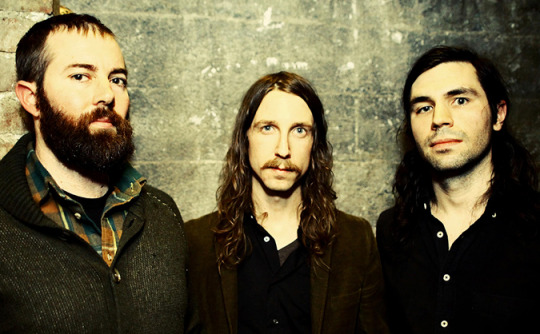
By Will Murphy
Ahead of shows at Dublin’s Whelan’s on Wednesday, March 22 and Belfast’s Empire Music Hall the following night, Will Murphy speaks to Brian Cook, bassist with Chicago instrumental masters Russian Circles about touring, politics, their latest album, the ideal audience, the craft of songwriting and more.
Hi, Brian. How’s the road been treating you? The next few months look pretty exciting in terms of venues and nations, is there anywhere that you’re all particularly looking forward to? What will you be listening to stave off the monotony of touring?
Touring has been good. We took care of our headlining U.S. dates last fall, and we divided Europe into two tours this time around just because there were so many cities we wanted to hit. We did Scandinavia and Eastern Europe back in October and November, which was pretty exhausting, but overall a great experience. Sometimes you get so accustomed to hitting the same places over and over again that it becomes easy to take things for granted, then you wind up playing a few shows in Romania and it serves as a reminder that we’re very fortunate to be able to do what we do. Now we’re out doing Western Europe and the UK, which is very familiar territory for us. Not as much of an adventure, but rewarding to be back in cities where we have friends and know the lay of the land. In terms of music, I’ve sort of reverted back to the old school touring listening habits. It used to be that you’d go on tour with a half dozen cassettes or a small book of CDs, then the iPod made it so that you toured with your entire music library and you’d never listen to the same album twice on a six-week tour. Now I’m back to traveling with just a few albums on my phone. I’ve been listening to a lot of Sun City Girls, Fleetwood Mac’s Tusk, Michael Rother, and Lungfish on my headphones. There has also been more than a few spins of the new Power Trip, Oranssi Pazuzu, and Rotting Christ albums in the van.
I remember seeing you when you were last in Dublin. What struck me was how unwilling you were to rush anything. Everything took exactly as long as it was going to take. It was a really ballsy move, and I’m wondering has it ever backfired horribly?
The bigger problem is not allowing enough time. Mike and I have so many changes and adjustments we have to do between songs—different tunings, different guitars, different pedal settings, different Taurus settings—and we do it all while bridging the songs with interludes. Plus, there’s the whole thing of trying to squeeze in a swig of beer and a toweling down of the face between all of that. We used to tour with these auxiliary delay pedals at the end of our chain that served zero purpose other than to silently notifying the rest of the band that we were ready to go into the next song. If the red light on Mike’s delay pedal was on, we knew he was ready. Same for me. The only problem is that sometimes one of us would forget to turn it on, and we’d stand there waiting for nothing until the guilty party remembered to stomp on the pedal.
youtube
Is there ever a frustration performing to an audience, given that so much intricate detail is lost when you port the songs to a live context? With that in mind, do you prefer to spend your time in studio constructing these mini epics or letting them loose on the audience night after night?
I’m not sure what the ideal audience would be. I remember Fugazi talking about how their anti-moshing stance grew to such mythical proportions that it seemed like people were afraid to dance at their concerts. I can empathize with that—I hate seeing violent dancing, but it also feels like a lot more work to play when people are totally stoic. The happy medium is when people are physically moving to the music but also respecting their neighbors. At this point, I try to look out into the audience as little as possible, because that happy medium is so difficult to achieve. As far as writing versus performing, they are both gratifying. I don’t think I’d be happy doing just one or the other. I love performing music live. Most of my love of other peoples’ music comes from watching it—or envisioning it—unfolding in real time. So the process of making a song happen in the present, in a very specific environment and with a select audience, is really magical. But if you don’t love the composition side of music, you should just stick to being in a tribute band.
You recorded a trio of albums with Brandon Curtis, each of which was absolutely stellar. Yet for last year’s Guidance, you opted to go with Kurt Ballou. What inspired this change? Was there ever a concern that Ballou might not bring out the same level of performance that Curtis helped to unleash? How hands-on was he during the recording?
Working with Brandon was amazing. We were really drawn to his ability to capture space and dimension with this work with Secret Machines. He’s also just an incredibly knowledgeable musician. He was good set of ears and a really good sounding board for those three records. We opted to go with Kurt Ballou on Guidance simply because we wanted to try something new, and we knew Kurt would share a lot of our musical reference points. Whenever you hire someone to produce a record there’s always that concern over their level of involvement, particularly if you come from a punk background. You don’t want some outside party compromising your vision and trying to make your songs appeal to a broader audience. But our songs tend to be so malleable and go through so many permutations that we have come to value having that set of fresh ears that can hear the different variations and have an unbiased opinion on what works and what doesn’t. In that respect, both Kurt and Brandon were amazing. I think Kurt tended to be a bit more focused on shaping tones while Brandon tended to have more ideas in terms of composition, but they both definitely made their mark on our albums. I can’t speak highly enough of either of them.
A number of groups who’ve recorded with Ballou have talked about Salem being a deeply unsettling town, given the commercialisation of its brutal history. Did any sense of this permeate the songwriting?
Salem is a strange place. It shuts down early. We would stop recording around 8pm just because dinner options after 9pm were virtually non-existence, which was an adjustments considering that we’re from Chicago and New York, where you can eat whatever you want at pretty much any hour of the night. But the witch trials weren’t really something that loomed in the back of our minds during our time there. The juxtaposition of the tourism trade and the public inebriate population was far more jarring.
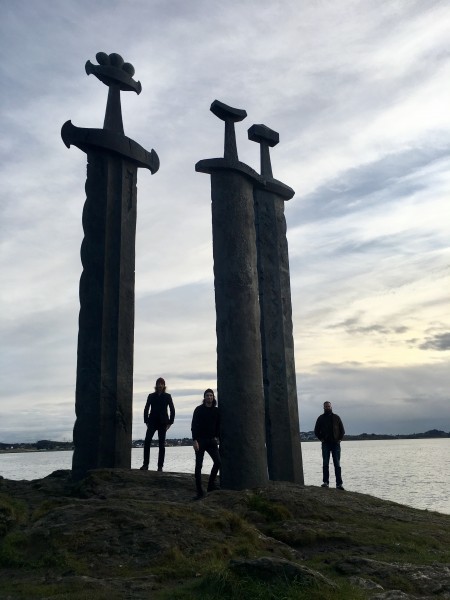
Your songs feel so meticulously planned and crafted. How long do spend with a single song? How do you know when it is ready or, if it’s the kind that’ll never be perfect, when, if ever, do you throw your hands up and say “fuck it, it’s good enough”?
Some songs come together really quickly. Some songs are labored over for months and months, right up to and through the recording process. The album is bookended by two compositions that were crafted by individual members of the band and transformed into full-band songs with a minimal amount of effort. Then there are songs like Vorel that are transforming even as we play them over the course of this tour. We have to set deadlines for recording otherwise we’d tinker with songs forever. There’s an old lesson I learned in a painting class: every twenty minutes, step away from your work to reassess where you’re at. Inevitably, you’ll step away at some point and realize it’s done and any additional brush strokes are just detracting from the immediacy of the work. It’s a similar thing with songs in the studio sometimes. Every once and awhile you’ll hear a playback and realize that any additional changes or embellishments are just going to diminish the impact of the song.
Tracks like Afrika and Lisboa suggested a focus on geopolitics and a wider cultural sphere. What made you choose these subjects? What was it about the Portuguese capital that inspired you?
I was definitely drawn to political bands when I was younger. I liked topical punk bands. I liked ‘60s protest music. Basically, I just liked bands that obviously gave a shit about the world and expressed some capacity for empathy. I hated love songs. I hated songs about dancing, or partying, or money. Of course, being too topical can make your music a bit dated. I love punk music from the early ‘80s, but it’s a little distracting to hear bands ranting against Reagan and Thatcher. We’re not an overtly political band; there isn’t really a way for us to do that as an instrumental group, but I do like infusing our records with imagery that has some sort of historical or political context, just because it harkens back to a lot of the music I was obsessed with during my formative years. As far as specific song titles, they have very specific meaning to us personally, but we prefer to keep those meanings unclear to the general public. That said, we’ve already mentioned this before in other interviews so I guess I can say it again here, Lisboa was given its title simply because Mike began putting the song together during some downtime on tour in Portugal.
youtube
Memorial featured some spellbinding vocals, whereas with Guidance you opted for a purely instrumental approach. What was the reasoning behind this? Are there any plans to bring in vocals for the next release?
We dabbled with vocals on Memorial and Praise Be Man because they seemed like interesting experiments. We have no plans of making vocals a recurring part of our method, but that isn’t to say we won’t feel compelled to explore the option in the future. I enjoy the fact that we can draw heavily from the world of underground metal, but I don’t think borrowing from the vocal styles of those bands would do anything to enhance our music. If anything, I think it would be a distraction. I think being an instrumental band has allowed us a lot more stylistic fluidity, and that is far more important to us than having a lyrical component to our music.
There’s a lot of darkness in the world currently. Trump and Muslim ban, Aleppo, the continued success of Nickelback. How, if at all, does the current state of affairs affect your songwriting?
Well, Guidance is ultimately a reference to our collective uncertainty. For the three of us in the band, it literally referred to a lot of uncertainty in our personal lives, but we tried to extrapolate that to a general sense of apprehension towards the future for the sake of the album. In that sense, “guidance” can refer to the mistaken notion that there is some sort of benevolent leadership out there that has the public’s best interests in mind, or it can refer more generally to the allure of some overarching answer to all our problems. It’s all a carrot on a stick. So it goes.
Finally, given the foreboding and gloom that your work is shrouded in, where and how do you find the inspiration for the more delicate elements of the tracks?
Being that we don’t all live in the same city, we spend a lot of time writing independently. And while we all write with the idea of crafting songs that lend themselves to the darker and louder end of our spectrum, we don’t shut out any ideas that may come up. When you’re playing your instrument alone in your room, a lot of times the quieter and mellower stuff winds up sounding a lot more satisfying than the paired-down versions of the heavier stuff. For example, Asa was not meant to be a Russian Circles song, but those notes sounded good together and it turned into a little song, and I forwarded it along to the other guys in the band just because we have a pretty open sharing policy with our music. And it wound up being something that resonated with Mike and Dave. Overboard was actually two separate songs that were written completely independently by Mike and I and they just happened to fit together. So while we never deliberately set out to write those kinds of songs, sometimes they just happen.
Photos by Ryan Russell and Tomas Mladek
(via The Thin Air)
9 notes
·
View notes
Text
Spring Break: UK + Ireland
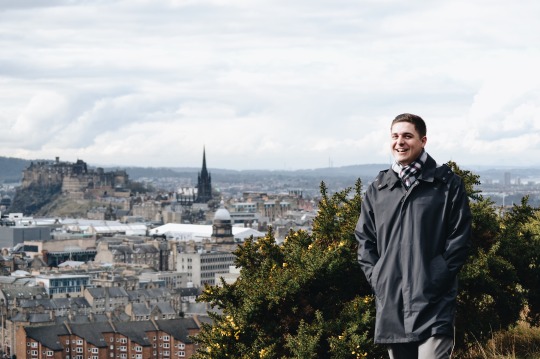
Just when I thought I could sit down and relax, I was wrong! What a week it has been! You’re probably thinking, well it’s about time that we get to read another blog post. I know, I know, it has been ages! As the saying goes, good things take time. This applies to my absence from posting within the past couple of weeks. So let’s get right to it! As my fellow peers and friends jetted off to warm places such as Italy, Greece, and Spain, I, along with my good friend Bridget, decided to be different and I’m so glad we did. Bridget and I met each other during our freshman year of college at Fisher. We were ecstatic when we both found out that we were accepted into the AIFS Study Abroad program back in September. Fast forward to now, and we have awesome memories to share with you all regarding our week-long Spring Break trip to Scotland, Northern Ireland, Ireland, and Wales. So we embarked on our 9-day journey by taking a 6-hour train ride from London to Edinburgh, Scotland. As I looked out the window when we arrived in Scotland, all I could see were hoards of sheep, and I mean a lot of sheep. Along with livestock were luscious green landscapes and seeing that reminded me of home, in other words, a nice change of scenery from the London cityscape. We arrived in Edinburgh around 7PM and stayed two nights at a church, which had been converted into a hostel. A hostel is a location, which provides inexpensive food and lodging typically for students or travelers who are trying to budget their money. To some this may not seem very appealing, it wasn’t to me at first but I eventually warmed up to it. While the sleeping arrangements typically had 4, 6, or 12 roommates, it was an awesome way to meet new people and learn about different cultures and experiences that others were able to share. At the Edinburgh hostel, Bridget and I met three high school students from Northern Scotland. They were very kind and gave us suggestions on sites to see. They shared their insight on Scottish culture, more specifically the education system. This conversation occurred mainly because they were high school students and wanted to know about our studies. So the next day we got up early and set out to explore the city. At our first stop, we visited the Elephant House Café which was where the famous Author of Harry Potter, J.K. Rowling, sat and found inspiration for the Harry Potter book series while she sipped on coffee and tea and stared out the back window, which faced the Edinburgh Castle.
Pictured at top: Me atop of Arthur’s Seat
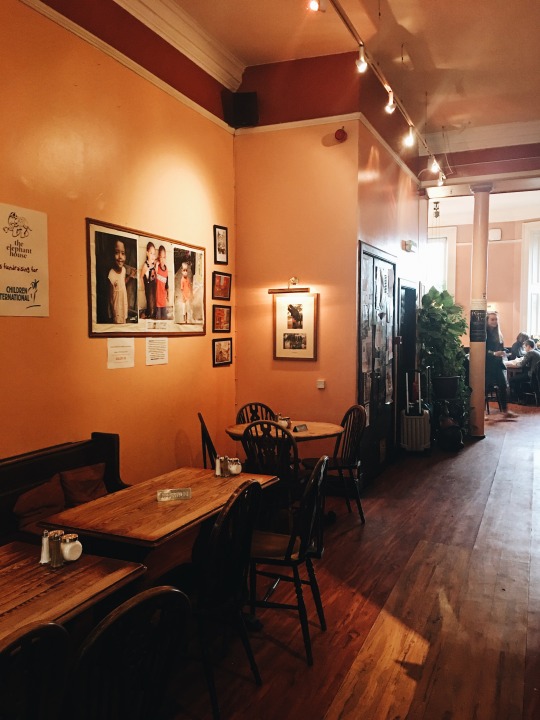
Pictured: The Elephant House Café
Next, we visited a nearby cemetery of famous philosophers, writers, and poets who were born or resided in Edinburgh. The cemetery also inspired J.K. Rowling so much that she named some characters in the books after names on tombstones within the cemetery. As we walked down the Royal Mile, the main road of the city, we walked by a scarf shop where I decided to go in and buy a lambswool scarf to keep me warm for the rest of the trip. Every place I go I buy at least one souvenir specifically tailored to each city. One of Edinburgh’s major exports is lambswool and I’ve always wanted a nice scarf so I thought, why not. Next, we headed to climb Arthur’s Seat, the main mountain in Edinburgh, which was at one time a volcano and gets its name from King Arthur. The views of the city from the top were absolutely breathtaking and worth the exhaustion from the climb. Remember the scarf I bought prior, yeah, that beautiful accessory came off pretty quickly as I climbed the mountain nearly about to sweat to death and pass out. If anyone knows me well enough, they know that I tend to avoid lots of physical activity.

Pictured: View from Arthur’s Seat
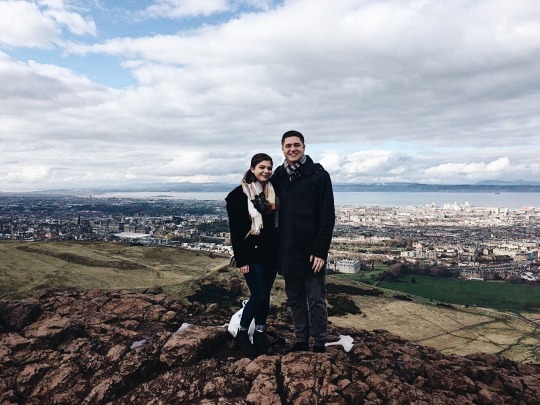
Pictured: Bridget and me atop of Arthur’s Seat
We definitely got our steps in for that day and even trekked over to the castle to get an up-close view. An interesting fact about the castle is that a royal castle has been at that same location since the 12th century and archeologists have concluded that human occupancy of the location dates back to 2nd century AD. Needless to say, it is definitely an amazing place to visit for sure and I highly recommend it.
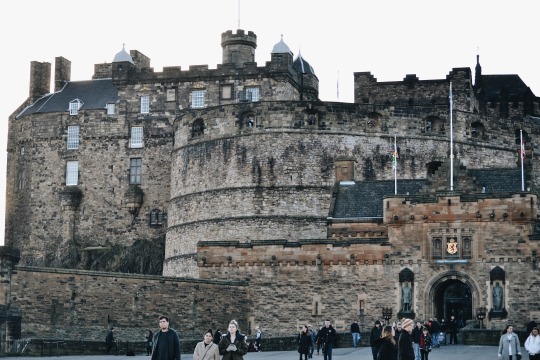
Pictured: Edinburgh Castle
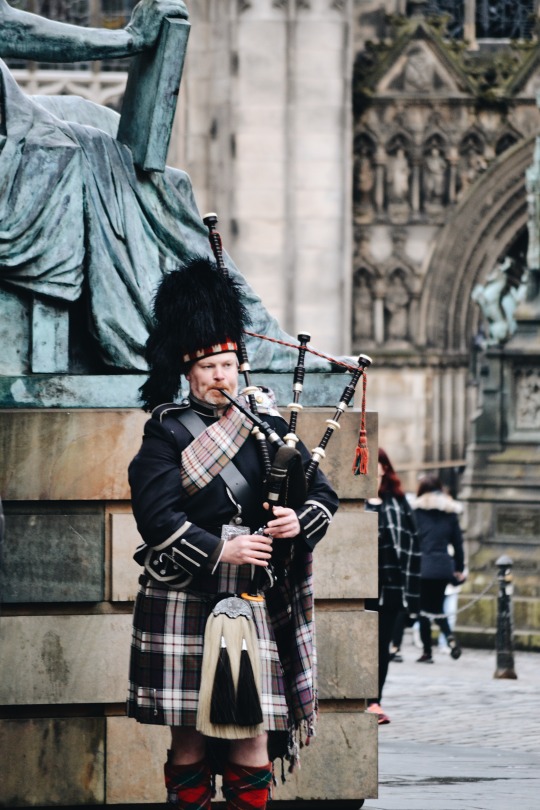
Pictured: Scottish Bagpiper

Pictured: Edinburgh’s most expensive apartment building (my favorite in terms of architecture-I have expensive taste)
The next day we departed Edinburgh and traveled by plane to Belfast, Northern Ireland. We arrived in the evening and ventured out into the city to the main area where shops, pubs, and restaurants were located. We grabbed dinner and strolled the streets looking at the art sculptures.
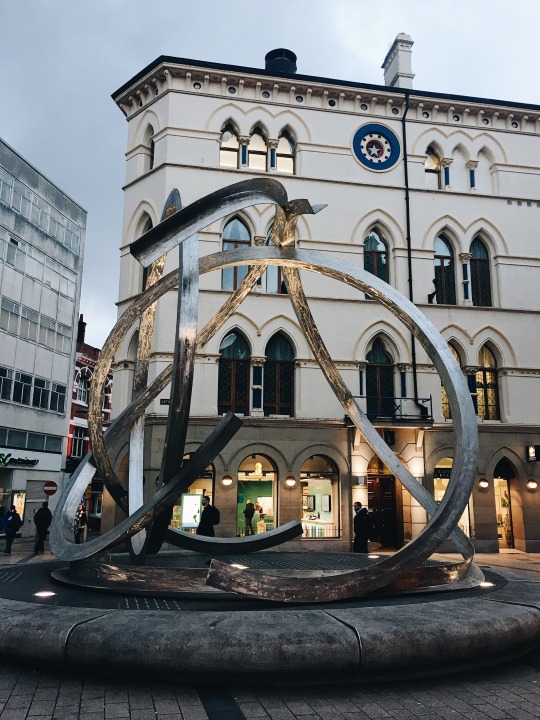
Pictured: The Spirit of Belfast
We spent one night in Belfast at a hostel, which appeared to be an old college dorm building. Bridget and I came to such a conclusion due to the fact that one of Belfast’s largest University’s was directly behind the building we were staying in. Luckily, the room we stayed in only had two extra people. Our roommates for the night were two young men, one from France and the other from Switzerland. We talked with them for a while and actually learned that the French guy had recently moved to London and in fact lives only two tube stops away from us. As for the Swiss guy, we learned that he lived in a small village where most of the people who reside there only speak Swiss-German. At that point in the trip, I began to realize that staying in hostels is actually quite interesting. The next day we caught a bus to the picturesque Belfast Castle, located just North of the city. The original Belfast Castle was actually built in the center of the city but unfortunately burned down in 1708 and was later rebuilt in 1811 at its present location and was designed by a Scottish man.
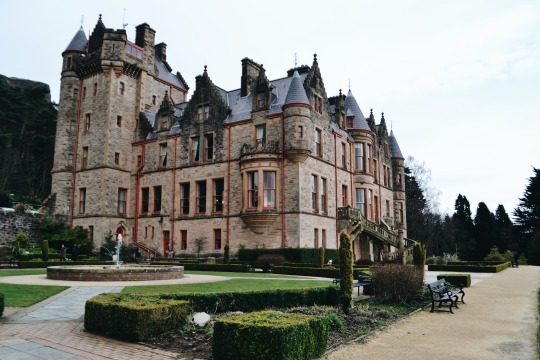
Pictured: Belfast Castle
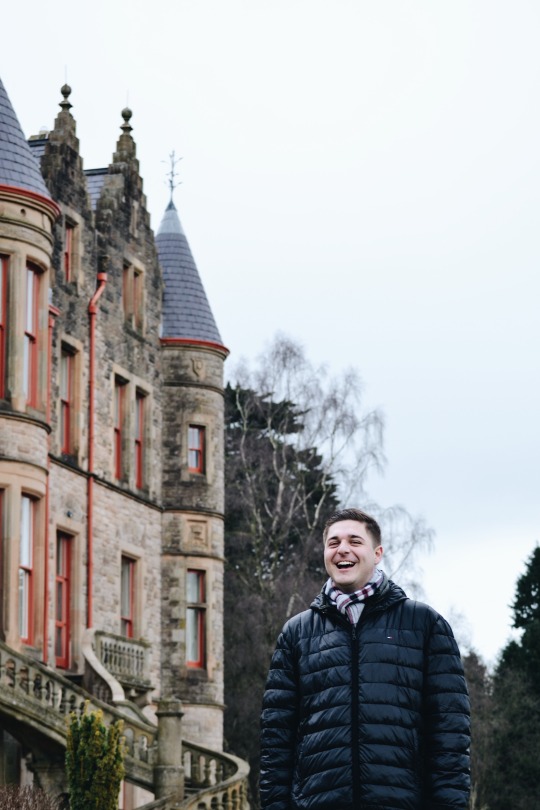
Pictured: Me in front of Belfast Castle sporting my new scarf
Later that day we journeyed down to the bay area and visited the Titanic Museum. The exhibit was incredible. I learned that at the time, Belfast was home to the largest port and ship export in the UK and most of Europe. During the Great Famine of Ireland, many people flocked to Belfast in search of work, ultimately building the Titanic quickly because of the influx of migrant workers.
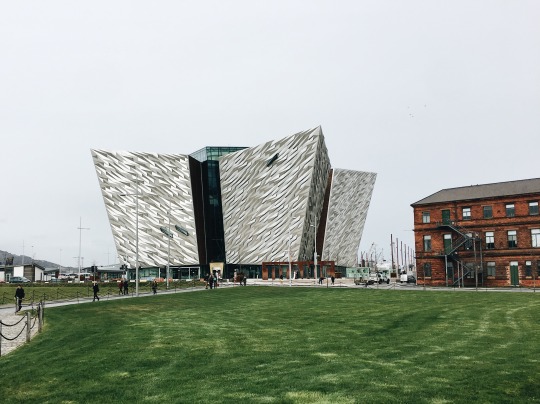
Pictured: Titanic Museum (Titanic Belfast)
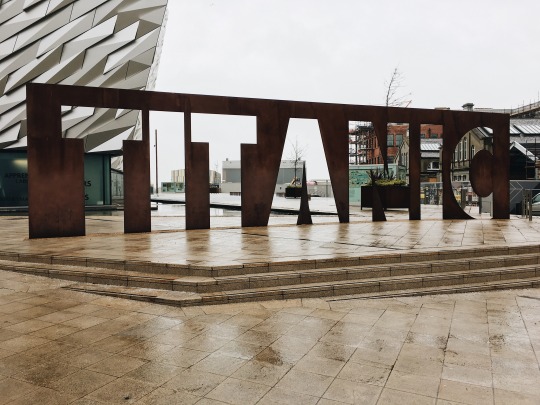
Pictured: Sign outside the Museum
After visiting the museum we headed to the train station where we boarded our train heading towards Dublin, Ireland. We arrived in Dublin around dinner time needed to switch trains in order to head to Galway, Ireland for a couple of days. Now remember, I usually do not like too much physical activity but somehow Bridget convinced me to walk 45 minutes from one train station to the other. Mind you, I had a 50lb duffle bag on my shoulder and it began to downpour halfway through the walk. It was then that I regretted not hopping in a cab to take me to the other side of town to catch the train. When we got to the train station I found a minute to breathe and also discovered a “Supermacs” which is the Irish version of McDonald’s. I thought to myself, ya know, I deserve to be rewarded with a crispy chicken sandwich, large fry, and a tasty coke. Even though I am abroad and have grown as a person, I haven’t changed at all! So we arrived in Galway in the later evening and headed directly for the hostel. We checked in and whipped open the door of our room and as if the night couldn’t get more stressful, we discovered that we would have to room the next two nights with an entire men’s rugby team. Oh my heavens did that room ever smell. On the bright side, we signed up for a tour the next day and had to get up early for to catch the bus. So at least we only were in the room to sleep and get ready in the morning. The next day we set out for the Cliffs of Moher. The tour lasted all day and our tour guide as amazing. A very intelligent older man who has been a tour guide for over 30 years taught us everything from the history of castles to the significance behind the concept of roof thatching on homes all across Ireland. We visited the first castle in Ireland but unfortunately weren’t able to go inside it because it was closed. Nevertheless, it was absolutely stunning.
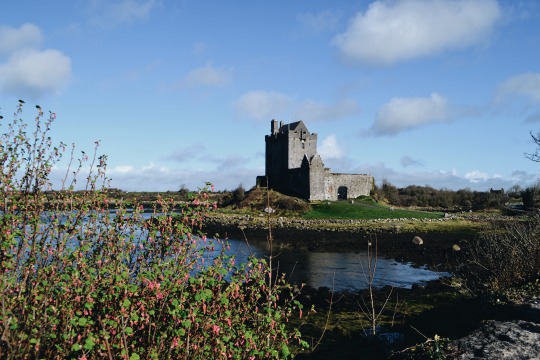
Pictured: Dunguaire Castle

Pictured: Home with a thatched roof
We arrived at the Cliffs of Moher in the afternoon and had a couple of hours to walk around the cliffs. I, of course, needed a full-blown photo shoot and forced Bridget to take lots of photos of me on my camera. I got very close to the edge and even sat on it. I’m still here and alive so that’s a great sign.
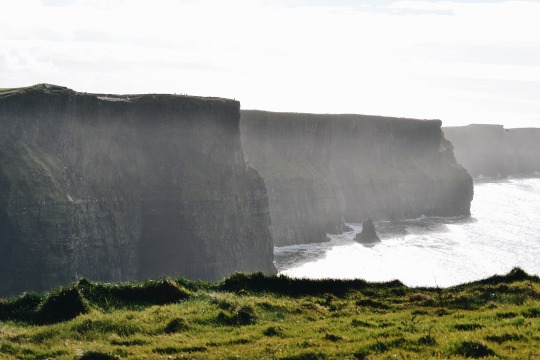
Pictured: Cliffs of Moher
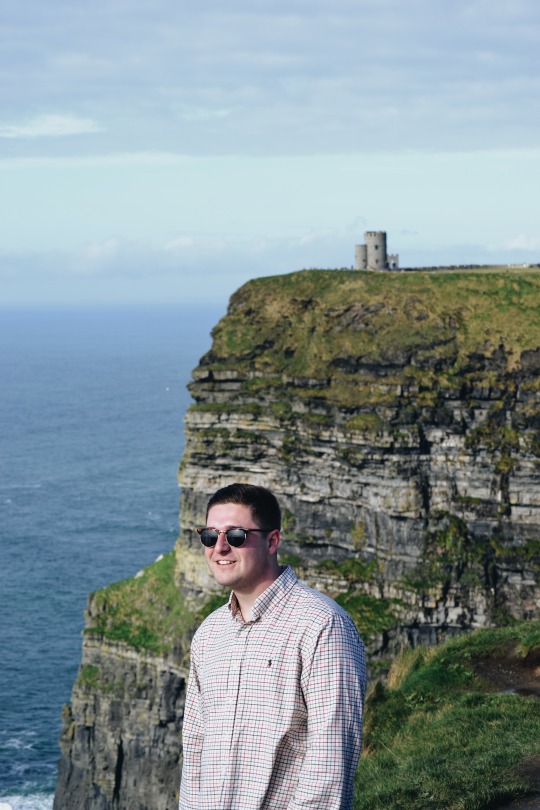
Pictured: Me atop of the Cliffs of Moher
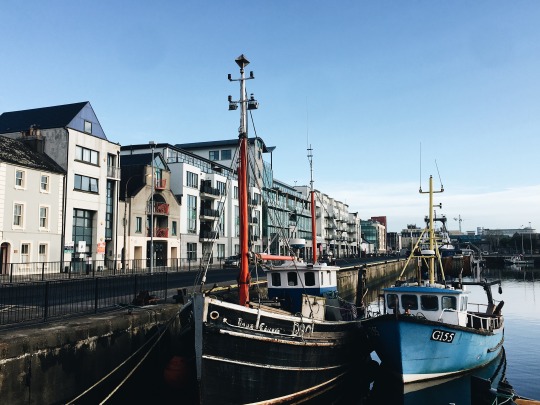
Pictured: Galway Bay
While walking along the cliffs we talked with a guy by the name of Adam who was also on vacation and on the tour as well. We introduced ourselves and talked quite a bit throughout the remainder of the trip. We learned that he was in his mid-twenties, originally from Florida, and had recently moved to Germany to work as a mechanic for the U.S. Air Force. When we arrived back in Galway that evening we exchanged social media profiles. Later that night he messaged us and invited us to meet up with him for dinner, we thought why not. So we went and had a great time. We went to a local pub and I even tried Guinness for the first time. It was really good. I also had fish n chips for dinner. When we were finished Adam was so generous that he offered to pay and we politely tried to tell him that it wasn’t necessary but he insisted. It’s truly a great feeling to realize that there are still very kind people out there these days. The next day we departed from Galway by train back to Dublin to spend the next two nights in another hostel. While in Dublin we visited St. Patrick’s Cathedral, Dublin Castle, Trinity College, and even had dinner at the Celt Bar where there was live music. We also visited the Kilmainham Gaol, which was a prison that held leaders of the 1916 Easter Rising and also was the location of their executions. On a lighter note, during our last night in Dublin, Adam messaged us on Facebook and told us that he had just arrived in Dublin and had extra tickets to the Country to Country Music Festival which was going on that night. He offered them to us and didn’t expect us to pay him back. Once again he insisted we join him, so we did. It was an amazing time. The major performers of the night were the Zac Brown Band. If you ever get the chance to see them, I highly recommend, they were very good live. While at the concert we introduced ourselves to the group of people who stood next do us during the concert. We learned that the couple were originally from Sydney, Australia and had moved to London for work. The other two people in the group were from Germany and were clearly major fans of not only country music but also the band performing. We danced with them, jammed out all night, and had an awesome time.
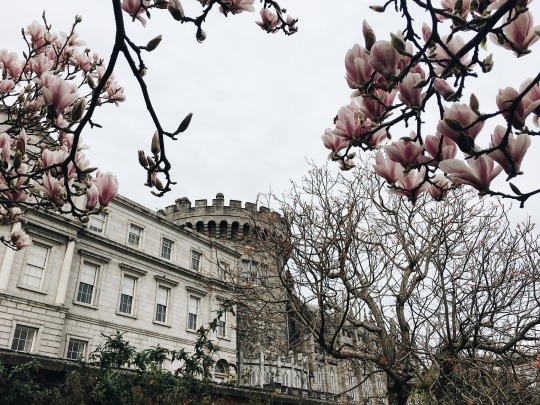
Pictured: Dublin Castle
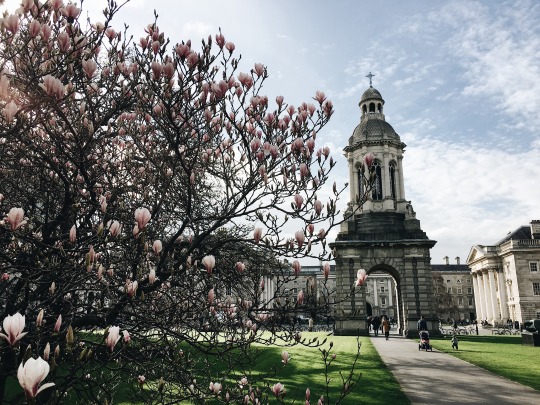
Pictured: Trinity College
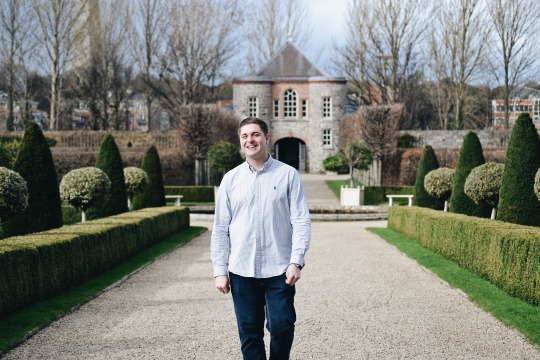
Pictured: Me in the Irish Modern Art Museum Gardens
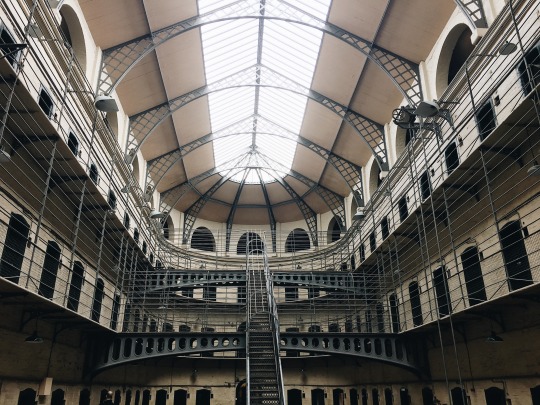
Pictured: Kilmainham Gaol
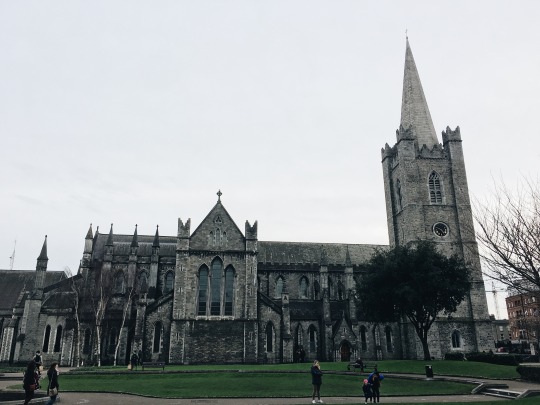
Pictured: St. Patrick’s Cathedral
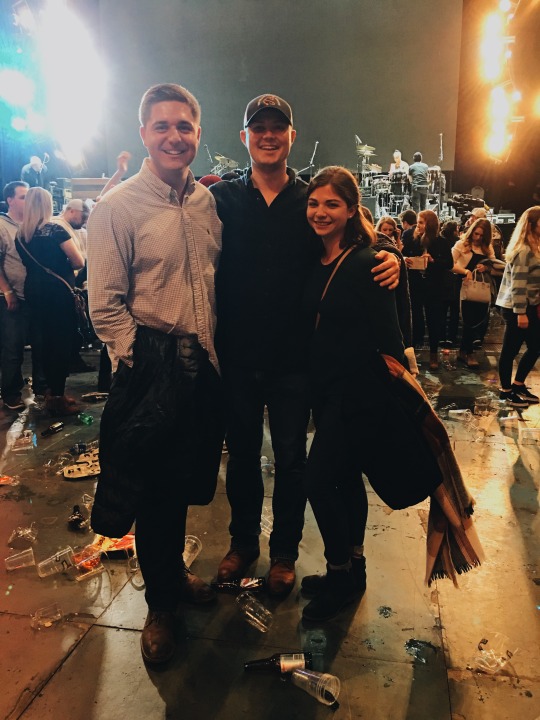
Pictured: The three of us at the concert
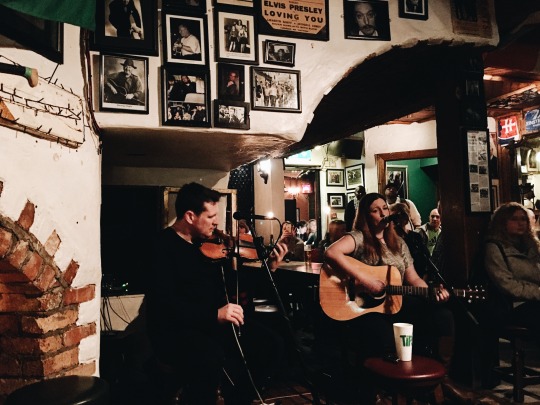
Pictured: Performers at the Celt Bar
The next day we left Dublin and traveled by plane to Cardiff, Wales for our last stop on our trip. When we arrived I instantly got a feeling that I would adore the city. A small seaside city, Cardiff gained its wealth due to the major amounts of coal that were mined and exported there. The hostel we stayed at for the night was so charming that I also highly recommend staying there. Originally built as an office building the inside of the building has original staircases, dark wood molding, and eye-catching wallpaper. The entire place was decorated with antiques, so basically very similar to my taste in decorating. It clearly makes sense as to why I loved it so much. So the next day, Bridget and I decided to part ways because she wanted to visit the Doctor Who Museum and I wanted to visit Cardiff Castle and knew we wouldn’t be able to fit in both since our train left that night. I visited the castle and toured the inside of the Keep, or the tower on the hill which over looks the castle. Luckily, I was able to visit the inside of the castle, which was so incredible. The photos fail to give it justice but I absolutely loved it.
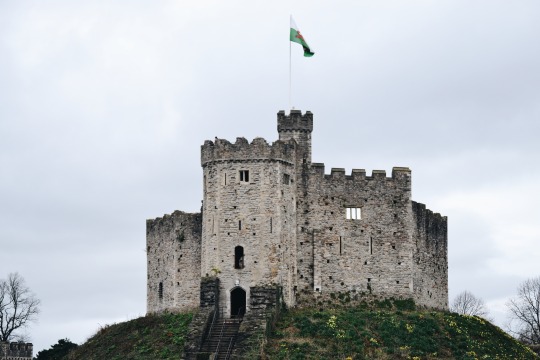
Pictured: The Keep

Pictured: Cardiff Castle
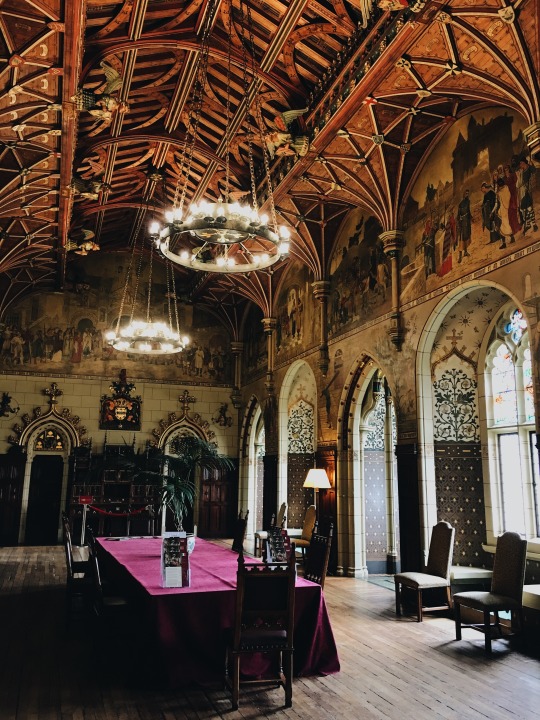
Pictured: The inside of the castle
In the afternoon, Bridget and I met up at Cardiff Bay and spend the afternoon there and grabbed some great food and took in the beauty of the parks and water. We also went inside of the Pierhead building, often referred to as the “Big Ben of Cardiff,” naturally, I adored it.
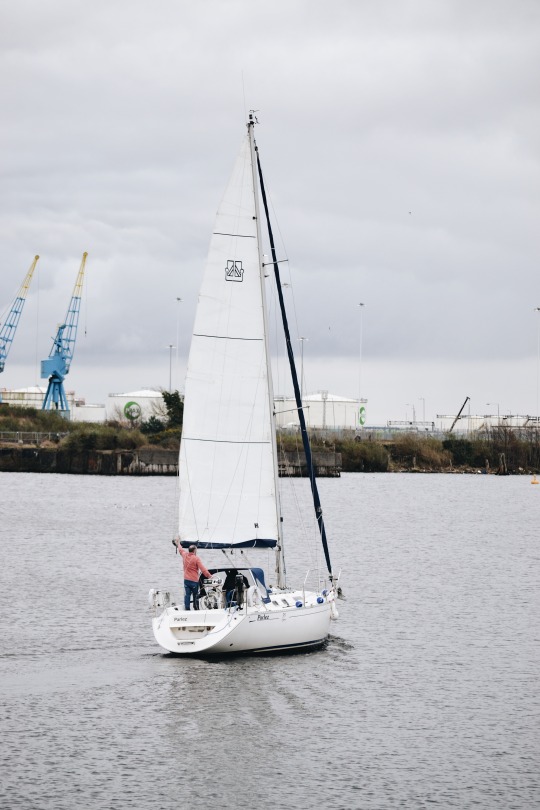
Pictured: Cardiff Bay
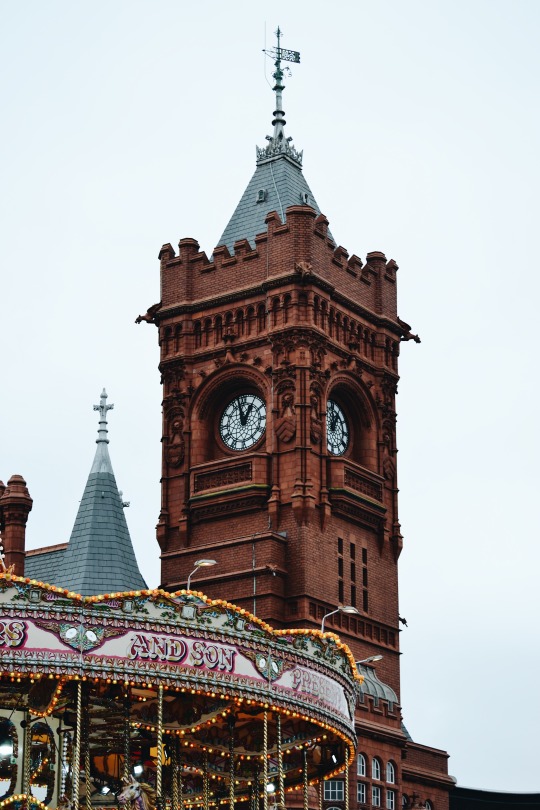
Pictured: Pierhead Building
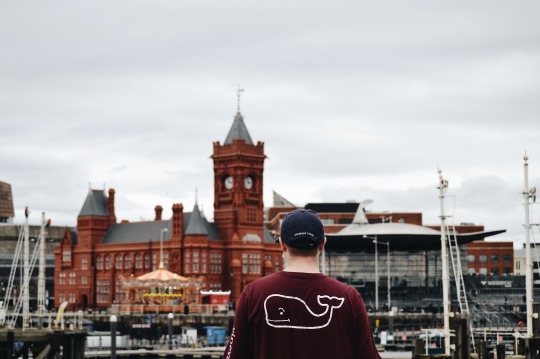
Pictured: Me in front of the Pierhead Building
Reflecting on my Spring break adventure, I realize that I am beyond blessed and am so thankful to have such amazing opportunities to see this beautiful world and discover all that it has to offer. During my trip I often found myself thinking long and hard about all the things that make me happy and it is my hope that I can in return give back by making others happy in everything that I do. I enjoy sharing my adventures with everyone and truly appreciate the support and kindness that I have received throughout my life. I’ll keep on continuing to smile and I hope you do as well. Keep following along. Itchy Feet is on the move!! Much love. XX
3 notes
·
View notes
Text
Three Guidelines For Booking Low Fare Air Tickets?
It is obviously good to take a journey. But the associated with plane tickets won't create smile. Brand new console worry, airfare doesn't in order to be be expensive;there are a lot of ways which can find airplane tickets for inside hundred dollars.

Flights to Malta could be chosen depending on the location you wish to travel from and spending plan needed for you have definitely. Make sure that you know about all alternatives available to you before therefore final pick. You can Bangalore to pune Flight to Malta without any worries and traveling to the island can be more affordable than choice. Travel And Tour is ordinarily not the only decision. There happen to be many some Bangalore to pune Flight names.
Keep in mind that the schedule for summer flights differs greatly from that winter flights and you have to plan accurately. Speak to your travel agent or visit travel websites to discover the ideal choice for your period of travel.
The appeal of London, does it include is the stop-over to everywhere. It is really a great city surrounded by other great cities. You can Delhi To Mumbai Flight to capital cities of quite a few of Europe's most fabulous region. You can stay in cheap hotels (if that's all can easily afford), get your meals at delicious, traditional restaurants and walk area streets most notably tourist an individual.
First thing that are going to need to perform is hunt for the flight that you want. For instance, if extra flab to find flights to Dublin, then you will ought to make make certain they are first. Make use of a search engine and then use keywords like "Cheap Flights Dublin" or "Dublin Cheap Flights" to find what you need for.
The search engine will then give you a long involving all services offering cheap flights to Dublin. While in order to at it, check if there are great deals shipped to your desired destination. There are web sites that compile all serves deals from airlines,
Where tickets are shown at considerable discount quotations. Make sure to compare expenses to society that look at on create .. There are sites where you can call for the cost of air travel tickets. This really really useful if expert flexible regarding the schedule of your trip.
Another technique Chennai to Delhi Flights is to look for a website that provides compare cheap flights to get the cheapest flight to your destination. These websites require for you to definitely enter particulars of your date and also the destination within a web article.
Then they will offer the particulars of flights entirely on a worksheet so you will be prepared to compare fees in order to locate the greatest offer for buyers. These websites have no reference to airlines rather than publishing ads on their web recto. You need to not combine them up with airline broker sites possess near exposure to airlines.
They get commissions from airlines when you can purchase tickets these.
With a range of airlines to choose from and an infinite array of travel sites, it is straightforward to uncover some cheap deals by simply doing some investigating.Visit every airline Web site that is existing locally and visit several travel sites like Travelocity, Expedia, Orbitz and Price line. The only difficulty along with booking wealthy like these is that oftentimes only certain dates are available, which may cause you to have to be flexible with your travel services. Check the Fair Comparison Sites:
A lot of websites which you could go to the individual airline's website and appearance the cheapest plane lotto tickets.
These sites help you compare all the available deals so that you can buy the engineered so suits you the best. Travel Light: When you travel, keep light. Stay away from carrying extra luggage with you in order to expenses.
#Mumbai to Chennai Flights#Bangalore to Pune Flights#Hyderabad to Chennai Flights#Delhi to Mumbai Flights#Mumbai to Kolkata Flights
0 notes
Text
Ten Years of Once: An Oral History of John Carney's Hit Musical
It's 2011, and Glen Hansard is worried. His breakout film, Once, is about to open as an Off-Broadway musical at the New York Theatre Workshop in Manhattan's East Village. Sure, the movie brought him and his co-star Marketa Irglova a level of fame in America neither could have ever dreamed of the duo had, at that point, played two sold-out shows as The Swell Season at Radio City Music Hall, won an Oscar, and garnered two Grammy nods but they both, Hansard especially, were anxious about how their delicate, incredibly low-budget indie film would transfer to the stage. What if these guys fuck up? Hansard reminisces. What if they turn it into some nonsense?
So one night in late autumn, Hansard decides to take the leads of the musical to his favorite Manhattan bar, an unassuming, dimly lit Irish pub on a quiet block on 5th Street called The Scratcher. He has his friends, including renowned Irish singer-songwriters Mark Geary and the late Fergus O'Farrell, meet him there as bartender Brendan O'Shea promptly locks the doors. After a few whiskeys at the bar, the musical's co-stars, Steve Kazee and Cristin Milioti, were led to the back of the bar alongside all of the other musicians, who had readied their acoustic guitars, tambourines, and other assorted instruments and began to play. Throughout the course of each traditional or modern Irish folk song, certain musicians would join in and sing everyone was expected to participate.
After a few tunes, it was now Kazee's turn. A self-described Irish folk superfan, Kazee, who was gearing up to play Hansard's Guy character, began to strum the opening chords to Van Morrison's classic track Into the Mystic. Oh my god, I was fucking terrified! he remembers. It was almost like this weird hazing, but more of an indoctrination into that world. It was like, 'Alright, if you're going to be doing this, know the roots of it; know that this is what it's about.'
I remember just beaming the whole night, Cristin Milioti adds, recalling her performance of an a capella song she had written. It was so, so beautiful and the music was gorgeous. I remember walking out when the sun came up and feeling on top of the world.
youtube
They had passed the test. Soon after, this iteration of Once hit the stage at the New York Theatre Workshop for a critically acclaimed one-month run and was quickly moved to Broadway, where it became one of the most successful musicals in recent memory, eventually winning eight Tony Awards in 2012 and a Grammy in 2013.
The musical, written by acclaimed Irish playwright Enda Walsh, gave Once, then a cult classic of sorts, a second life. Though Glen Hansard and Marketa Irglova had been playing some of the world's most important stages for years, their music was introduced to a different audience entirely hell, the aforementioned O'Farrell song Gold, an inclusion on the Once Soundtrack originally recorded by little-known Irish band Interference, was being performed onstage at the Tony Awards, complete with choreography and about a dozen voices.
So, how did we get here? Hansard's band The Frames was playing midsize rooms across America Chicago's Metro and New York's Bowery Ballroom, for instance but they surely weren't hitting No. 7 on the Billboard Top 200 Albums Chart like the Once Soundtrack did on March 15, 2008. To understand the Once phenomenon, we need to dig deep in the film's origin story, which now dates back a full 10 years since its release. It's a narrative as absurd as it is unlikely; a low-res, quickly shot, extremely independent Irish film that only hit dozens of art house movie theaters became ingrained in American popular culture on the backs of two extremely talented musicians with little to no acting experience and a director who never gave up.

I've got it! screamed John Carney as he ran down the stairs of his house in Dublin toward his girlfriend in 2005. Carney, then a struggling filmmaker a few years removed from On the Edge (one of Cillian Murphy's first movies), felt as if he'd finally cracked something, though it was unknown what that was.
It was one of those moments with this script, he says over the phone a few months ago, now twelve years after his eureka moment. With this idea, with this story, I felt like I had finally managed to crack a story that would have universal appeal no matter which way you did it.
That original screenplay was simply a page-long outline of the story, beginning with a musician meeting a woman on Dublin's Grafton Street, a pedestrian walkway famous for its many busking artists, and ending with the unnamed female character receiving a piano at the end. The film was set to star Cillian Murphy, fresh off of his portrayal of Scarecrow in Christopher Nolan's Batman Begins, and would include Glen Hansard and Damien Rice (among others) as its musical advisors, helping Carney develop the busker character while also writing new songs for the soundtrack.
Upon Hansard's first conversation regarding the film, he insisted on introducing Carney to Marketa Irglova, whom he had met while on tour in the Czech Republic and would eventually fall in love with. She'd frequently visit Hansard in Ireland and they would routinely throw dinner parties with 20-30 of his closest friends. At some point, Hansard had invited Carney over.
Glen had a piano at the house, and at some point John asked if I would go to the piano and play something for him, Irglova says over a lengthy Skype conversation. I sang a song and played a piece from one of my favorite movies, called TheDouble Life of Veronique, and then Glen and I had a concert. [Carney] was like, 'OK, well this is as good of a place to audition as any.' At the end of the party, John was like, 'I think you're the girl!' and I was like 'What?' I don't think I would have gone to a proper audition. I would have been totally too intimidated to go into a room where there's a movie producer and a director and a casting agent and I had to read some lines from a script.
After attending an early Swell Season concert a couple of nights later, Carney was enthralled by Glen and Marketa's onstage chemistry. After that, Irglova adds, He said, 'The two of you are the people for this movie. Whatever energy you have together is exactly what I'm looking for.'

It was more important for Carney that the character was a great singer who could act moderately, rather than a moderate singer who could act impressively. He felt that if he was enchanted by the whole music part, everything else could just follow.
Enda Walsh, a close friend of Murphy's, reiterated the misguided idea of an actor performing Hansard's music: 'I just read this script called Once written by John Carney,' [Murphy] told me about. Cillian turned around and said, 'If I was in it, I think I'd ruin it a bit. I really think Glen should be in it.' It was perfect that Glen ended up being in it because he's not an actor; he had a real honesty to it.
But try telling that to a movie's financial backers, who were counting on a big-name star to carry the film. Though it was a huge risk one that lost him a fair amount of money over time, Carney realized that Hansard was the man for the role; the character was loosely based on him in the first place, and he had acted previously in the Irish classic The Commitments, though that was well over a decade earlier. Several of the scenes that involved performing on the street had actually happened to Hansard in real life.
In a sense, I almost said that Once would be my last shot as a filmmaker, Carney explains. There was a lot riding on it for me.
With so much on the line for Carney and a miniscule budget of just $150,000, a bare-bones crew of about 12 people, and a cast of predominantly non-actors, it didn't seem as if the film stood much of a chance. Everything was shot on location using natural light, and Carney and Hansard's friends served as extras even Hansard's mother makes an appearance in the dinner party scene. The whole movie was shot in less than three weeks with few to no benefits for the cast and crew; over Skype, set photographer Cleary describes the production situation thusly: There was no craft services or any of that shit. On set, if you wanted a coffee, you'd have to walk down to a caf and buy one with your own money. There was no catering when we broke for lunch. I remember once we had pizza, which was regarded as a real day out!
At one point, it looked as if the movie would simply be sold as merchandise at Frames and Swell Season gigs. Getting a distributor was nearly impossible the sound was muddy, and it didn't look great on a big screen since it was shot on little digital cameras and it was getting rejections from most major European film festivals. Only Galway Film Fleadh picked it up, where it was shown in July 2006.
By chance, John Nein, the Senior Programmer at the Sundance Film Festival, happened to be in the audience at Galway and later rung up Carney to ask if he'd like to put Once into the running. Three or four months later, it was accepted.
To get into Sundance was mind-blowing because that's the sort of thing that's the Holy Grail for me, Carney says. Particularly back then, it was pre-iPhones, pre-anyone-could-make-a-movie and making a movie for $100,000 was still a novelty. To me, to be honest, getting accepted to Sundance, then having some little triumph there, was the highest accolade that I could get for that movie.
youtube
Immediately upon its screening at Sundance, seemingly everyone wanted a piece of Hansard, Irglova, and Carney. The film won the 2007 World Cinema Audience Award in the dramatic category, and film critics were falling head over heels for it; Chicago Tribune film critic Michael Phillips wrote, It may well be the best music film of any stripe since Stop Making Sense a generation ago.
Glen Brunman, the head of the Sony Soundtracks division that had previously put out the soundtracks for Garden State, Titanic, and Forrest Gump, among many others, did a deal on the spot. I don't know what the number was, but he got it for next to nothing, Jack Hedges, the general manager at Canvasback Records, explains. A couple of the executives saw the movie, and I don't think anyone knew what to do with it. It was being shopped around the building like, 'We've got this cool thing and we're not really sure what it is, but we didn't spend a lot of money on it and it's cool.'
Canvasback Records, which had just been launched months earlier under the Columbia umbrella, were the first to raise their hands. Hedges, just 26 years old at the time, had his first signing. Simultaneously, Fox Searchlight won the distribution rights and immediately proceeded to book Hansard and Irglova on an American press tour where they would perform after each screening.
It was the most amazing thing! Hedges exclaims over drinks on a cold Bushwick winter night. You just watched this movie and then this thing came to life in front of you. It was like in Purple Rose of Cairo where the guy steps out of the screen and into the movie theater, and now he's in the real world. The reason we were so drawn to it is that yes, it's a movie; yes, it's a soundtrack; yes, it's a musical but the people who write the songs and sing the songs and play the songs in the movie are here and are available to write the songs and sing the songs and play the songs in real life.
While Once never had a wide release it was only ever shown at art house theaters it managed to make $23,344,056 worldwide, or roughly 155 times the film's production costs. Domestically, it was the 150th highest grossing movie of 2007. The numbers qualify it for a massive box office success, even as the film itself slid into the cult movie cannon.
But those who did see it in theaters raved about it. Steven Spielberg famously told USA Today, A little movie called Once gave me enough inspiration to last the rest of the year. It led to infinite opportunities for Hansard and Irglova: they contributed to the I'm Not There soundtrack, covering You Ain't Goin' Nowhere, and The Frames were chosen to open for Bob Dylan's Australian tour.
youtube
Though the movie was the perhaps the biggest surprise of 2007, much of its longevity stems from its soundtrack 13 acoustic tracks, all written and performed by Hansard and Irglova themselves with the exception of the aforementioned Gold by Interference. Even after the album hit No. 2 on the Billboard Soundtracks Chart on July 7, 2007, sandwiched between Hannah Montana and High School Musical, it steadily gained popularity due to Canvasback's aggressive MySpace and iTunes campaigns. Just over a year and a half removed from playing the Lower East Side dive venue Pianos, the duo performed at the almost-3,000 capacity Beacon Theatre on the Upper West Side in November 2007.
A mixture of Frames songs and new ones, the tracklist was chosen by Carney himself. Though the film's opening number, Say It to Me Now, dates back to 1996's Frames album Fitzcarraldo, many were written specifically for the movie. When you listen to the songs, there's lots of unfinished lyrics we didn't have time! Hansard explains. We had to have songs finished for shooting days. Myself and Mar would be writing some songs after the shoot for the next day. Things had to be knocked together really quickly, which was actually really helpful. As Brian Eno says, 'An artist's two best friends are no budget and no time.'
The long and steady climb for Hansard, Irglova, and Carney hit a fever pitch on January 22, 2008; the Once soundtrack was officially recognized by the Academy, and Falling Slowly was nominated for Best Original Song. The promo tour, the social media push, and the fluke Sundance submission none of this was ever done with an Oscar nomination in mind. (Remember, this was a film to very likely be sold at merch tables in the back of concerts.) Now, suddenly, the core Once team found themselves in the heart of it all in Los Angeles, with some of the biggest celebrities in the industry falling over themselves to hang out with Hansard and Irglova, not the other way around. They were half the world away from the rain-drenched Grafton Street where the film opens and then some.
After a lengthy couple of weeks of around-the-clock press and parties, the duo hit the Kodak Theater stage for their Oscars performance. To say they were out of place is an understatement similar to when Elliott Smith, complete with an oversized white suit, sang Miss Misery in 1998, Hansard and Irglova played a largely acoustic rendition of Falling Slowly, with subtle added strings from the orchestra under the stage. Irglova's voice was shaky at first, but after a few seconds, a tie-less Hansard looked her way and smiled, barely able to contain his amazement that they were at the award ceremony at all. That understated emotion hearkens back to Carney's original idea to cast the duo in the first place; their onstage chemistry from that 2005 Dublin Swell Season show was on full display for the world to see. Armed with his old acoustic guitar with the massive hole in it, Hansard and Irglova had fully arrived.
youtube
Later in the broadcast, perpetual mispronouncer John Travolta took the stage to announce the winners of Best Original Song. Against a triple attack of Stephen Schwartz Enchanted tracks, Travolta opened the envelope to Hansard (pronounced Han-SAHRD) and Irglova's names. Immediately, Hansard's hand went immediately to his face, covering his eyes, not believing what he just heard.
Hansard began his speech by laughing, barely able to blurt out a very Irish tanks before uttering, Go raibh mile mile maith agat, which roughly translates to Thanks a million. After a short, minute-or-so speech about the humble beginnings of the film, he concluded with a simple plea Make art, make art!
But when Irglova stepped up to the microphone, the orchestra began playing them off, leaving Marketa unable to give her speech. Quickly realizing their mistake, the house band stopped performing their version of Falling Slowly, but by then it was too late the duo had already begun walking backstage for champagne, interviews, and celebrations.
'Wait a minute, [host] Jon Stewart wants to talk to you before you go back to the seat,' Irglova remembers. He was standing by the side of the stage, and he explained to me quickly, 'Listen, you didn't get to do your speech, and we felt bad that you got interrupted. There's a commercial break now. Do you mind going back on the stage and saying whatever you were going to say?' I really believed that I was going to talk to the room while they were taking a break for the commercials.
While high off the moment, Glen and Marketa were just off on the side of the stage joking about making their Oscar trophies kiss, not thinking for a moment that she would be invited back to give a full-length speech. Then all of a sudden, Stewart returned to the stage and said, I just wanted to do something very quickly. The winner of best song, Marketa Irglova, didn't get a chance to say her thank yous, so I just wanted to bring her out again real quick. Enjoy your moment!
And as I was walking on the stage toward the microphone, I started realizing that this was live because all the cameras were recording, Irglova adds. It sort of hit me 'Oh no, this is going to be part of the thing!' I think under normal circumstances, I probably would have been nervous and all of that, but I was so high on joy and the insanity of the experience that I couldn't. There was no room for being nervous or being fearful of saying the wrong thing. I'm really happy with managing to say something that made sense because really, it was almost like putting somebody on stage who has just done ecstasy. It's something that shoots out into space that's why all of these crazy speeches happen during these ceremonies because you have to bring yourself back to earth from the amazing place in space that you get teleported to.
And what a speech it was, especially given the circumstances. This is such a big deal, not only for us, but for all other independent musicians and artists that spend most of their time struggling, and this, the fact that we're standing here tonight, the fact that we're able to hold this, it's just the proof that no matter how far out your dreams are, it's possible, Irglova said in a remarkably calm manner. Fair play to those who dare to dream and don't give up.
youtube
With those words, Hansard and Irglova etched their names in Oscar history. Their soundtrack, a mixture of old Frames songs and new ones written at lightning speed, hit No. 7 on the Billboard Top 200 Charts three weeks later, simultaneously topping the Independent Albums Chart.
Over time, Falling Slowly would become a classic, becoming a go-to American Idol song while soundtracking weddings to this day. The duo toured the world for a few years, hitting Glastonbury, Coachella, Newport Folk Fest, and pretty much every stage in between. In 2009, the pair reprised their Once roles in an episode of The Simpsons. Soon after, the couple broke up, but The Swell Season continued to heavily tour through 2011. By then, the film and its corresponding soundtrack had returned to its cult status once again, widely considered one of the best indie productions of its decade, leaving a beautiful and memorable impression on its generation.
After the Oscars, people were coming at them from all sides with all kinds of 'Do you want to do this thing? Do you want to do that thing?' Jack Hedges remembers. They were getting offers to do everything. They said no to 90% of it. I just remember [their manager] Howard [Greynolds] telling me nonchalantly, 'There's these Broadway guys talking to us, and they want to do this as a musical.' I'm thinking to myself, 'I don't know if that's going to work!'
Many people in the Once inner circle shared this same notion if the movie worked so well, why mess with it? Musical renditions of movies rarely, if ever, live up to the original film, let alone even come close. Hell, Spiderman: Turn off the Dark was already running into issues at this point in time.
For the Broadway rendition to work, it simply had to be different. The film works so well due to the intense intimacy of it; musicals are notorious for overstuffed and oversung, corny ballads featuring choreography and multiple singers at once the antithesis of the movie's stripped-down, largely acoustic tracks.
In my mind, it was never a good idea, Hansard explains. I never liked the idea of it, so I can kind of put my hands in the air and go, 'It's not my thing.' Mostly what we did was resist. Ironically, in the resisting, some good decisions were made. There were a couple of directors from the beginning that had they got their hands on it, it would have been pure ham. Through the resistance of myself, John, and Marketa, they eventually went with people who, first of all, didn't do musical theater, and second of all, did a really good job of writing it for a new place. If the musical never happened, it'd have been fine with me.

One of those people they eventually enlisted was Enda Walsh, an award-winning, Dublin-based playwright, who had never worked on a musical before. While he loved the movie, like many, he initially struggled to see how it would transition to the stage musicals aren't really part of the Irish theater tradition, after all. To soothe Hansard's fears, Walsh, during the early workshops in New York, remembers confronting him, saying: I promise you, if it turns into a piece of shit, I will tell you and I'll pull out of it.
With Black Watch director John Tiffany at the helm and Walsh writing the script, this was guaranteed to be a different kind of musical; the duo's past work can be categorized as anything but light and upbeat Tiffany's biggest hit prior to Once was Black Watch, about a British regiment in the Iraq War so they made a point not to go overboard with Broadway-style theatrics.
But that being said, Walsh in particular wanted to insert some much-needed humor into the play. He wrote Girl as a completely different character than the one Irglova portrayed. She needed to be a force, and he needed to be someone who wouldn't move and then began to, Walsh explains. I really wanted a Girl who was really pushing a rock that won't move. That's the brilliant, quiet tragedy of it she gave him the confidence to go, and that's really hard because you want him to stay.
As a result, Guy was written to be relatively similar to the Hansard interpretation and if anything, a bit more insecure and sluggish than the film version. Girl was written to be loud, brash, with loads of attitude; though the story remained relatively unchanged, the character was completely reimagined for the plot to move along.
In this context, the musical casting makes complete sense. Steve Kazee, who was eventually chosen to play Guy, saw Once at a small theater near the Lincoln Center on the Upper West Side of Manhattan right when it was released and then proceeded to attend multiple Swell Season concerts, even routinely putting the film on TV just before falling to sleep. Prior to his agent calling about the musical, he routinely ranked Once in his top 10 films of all time.
I'd never seen the film, and I'd never heard their music, Kazee's co-star Cristin Milioti says. I knew who they were because I remember them winning the Oscar and I knew the song, but I didn't know it that well. I was sort of blissfully unaware.
With no prior knowledge of Irglova's portrayal of Girl, she was perfect to play the revamped character. Purposely staying away from the film and its soundtrack while the musical was in production, she actually just watched the movie for the first time on a plane returning from shooting season two of Fargo in mid-2015.
Though it's most notable how the lead characters were written differently than in the film, there were many other variances as well. Perhaps the emotional high point of the movie comes when Guy and Girl take a motorcycle ride to Killiney Hill Park and Guy asks, Do you love him? Girl responds with a Czech phrase that's never translated with subtitles. It's obvious to the viewer that there are sparks flying between the two characters throughout the entire film, but they are never actualized.
youtube
In the musical rendition, there was more of an emphasis on Girl and her family, and as such, an LED-screen was placed near the top of the stage to translate into Czech as an attempt to make the Eastern European immigrant conversations more lifelike, even though they are spoken in English. However, Milioti's character breaks into Czech for the intense moment outside of Dublin, but this time, her words are translated onstage for everyone to see I love you. The characters pause for an extended period as those words sink in, leaving the audience all the more dejected.
It seemed like a really important thing for an audience to understand, Walsh explains. To read that as an audience without him understanding and to feel that you know as an audience is really heartbreaking.
Along with the subtitles, there was more of an obvious plot about Irish immigration within the musical, though it played an extremely important, if slightly subdued, role in the film. When Carney wrote the screenplay, Eastern European immigration to Ireland was at an all-time high; due to the Celtic Tiger economic boom beginning in the 1990s and extending through the mid-2000s, the foreign-born population exploded to 15% in 2006, up from 6% in 1991.
At its core, Once is the story of the conflict between the Irish instinct to leave for supposed greener pastures abroad in this case to London and the Eastern European enthusiasm for their new home. This concept reaches a fever pitch in the scene where Guy and Girl apply for a bank loan. In the movie, the scene is relatively rushed, but in the musical, Walsh wrote in an extended, prideful monologue about Irish culture as a whole, further pushing the immigrant versus emigrant narrative:
For an island this tiny, to make all of these poets and writers and musicians this is insane. And yet, on this tiny, little rock in the middle of the ocean, for centuries, you have made men and women who can speak and sing of what it is to be a person. Yates, Swift, Wilde, Joyce, Beckett, Van Morrison, Enya, the fantastic people who give the world Riverdance But it is people like you, it is people who invest in the Irish culture to make the culture, so you are responsible to show the world that Ireland is still here, that Ireland is open for business!
In the end, Guy still leaves for London to reunite with his ex girlfriend, but her plea for Ireland resonates, even though that wasn't the intention. I wrote it in because I was going, 'This is an incredibly manipulative thing that this girl is doing,' Walsh says. Every Irish person loves to be told just how extraordinary the island is and how many writers are from there. Fuck, wouldn't it be great if she walked in there and blew a bunch of smoke up this guy's arse? What happened then was the more we did it, people were going, 'Right on! Yeah!' When we do it in Ireland, people start clapping, and I'm thinking, 'No! I meant it as a joke!'

But even still, many of film's major players were anxious. Hansard's night at The Scratcher helped ease some of those tensions, but they didn't go away completely. He worked one-on-one with Kazee throughout multiple intense sessions, once advising him to drive across America and busk in small towns, which Kazee later did. One day during the New York Theatre Workshop rehearsals, Hansard pulled Kazee aside to test his performance skills and the two of them went downstairs into the basement of a church across the street.
It was one of those old places where the ceiling is only like six or seven feet, Kazee remembers. We were hunched over in this room, sat down in these chairs, and were maybe three feet apart from each other facing each other. And he says to me, 'I want you to play Say It to Me Now for me, but I'm going to play it for you first.' So he pulls out his guitar the guitar with the hole in it and he proceeds to give me a Wembley Stadium-type performance of Say It to Me Now. It was definitely a this-is-how-it's-done-so-let's-see-if-you-can-do-it-this-way thing. In that moment, I thought, 'Steve, this is your one moment. I don't care if you can't speak for another four weeks. You leave everything on this fucking floor right now.' It was like one of those moments from 8 Mile where I put the hoodie up and I hit that first chord and I didn't look back. I got done and he was like, 'Fair play man, fair play.' It'd be like a Beatles fan getting to play to one of The Beatles. He was, in my mind, my musical hero at the time.
Reflecting the way Walsh wrote the main characters for the musical, Hansard and Irglova took completely different approaches to offering advice or their level of involvement when the play was in its infancy. Irglova as did Carney who asserts that he didn't want to be that guy who was milking my own ideas for years mainly stayed away from it all, dropping by once or twice simply to see how it was all going. I was excited to see how they did it, but I had no need to try to control the result in any way, Irglova says. They approached me when the play was just about to start in the Off-Broadway theater, and I met with Cristin for a coffee. I was very happy to do that, but I don't know if she got anything out of it. She wanted to make it her own thing and she did. I think she did a great, great job at making this very endearing, attractive, and funny character in theater space. I couldn't have been happier with the adaptation myself.
After about a month or so of Hansard showing up to rehearsal every couple of days or so, he was taken aside by director John Tiffany and the two went for a drink. Very straight-up and very blankly and very straightforward, he said to me, 'Glen, thank you so much, it's really helped. Now will you fuck off!' he laughs. That was the last I sat in on rehearsal.
First shown in Cambridge, MA, in April 2011, the play hit the New York Theatre Workshop on December 6, 2011, with previews starting three weeks prior. The Off-Broadway rendition garnered major buzz, even in a sub-200-seat venue, with critics raving about it: It may sound like heresy to fans of the 2007 Fox Searchlight release, but this bewitching stage adaptation arguably improves on the movie, expanding its emotional breadth and elevating it stylistically while remaining true to the original's raw fragility, reads a review from The Hollywood Reporter.

Sold out every night, the news broke on December 7, 2011 just a single day after its Off-Broadway opening night that it was going to be transferred uptown to Broadway at the Bernard B. Jenkins Theatre. I remember John, our director, taking me out one night when we were downtown and telling me before he told the cast that we're going to Broadway, Milioti reminisces. He sat with me and looked me in the eyes, and I didn't believe him.
Officially opening on March 18, 2012, the musical proved to be a bit of a slow burn. People were curious, and they didn't really know what it was, Kazee explains. Especially Broadway audiences, they hadn't seen the film, they hadn't heard of the film, and they didn't know the music. It was almost a nightly basis where somebody asked me if I wrote the songs. Slowly but surely, after the first month of us performing on Broadway, you started seeing every night that the house got more and more full and the lines at the stage door got deeper and deeper. Within the first month and a half, two months of us being up and running, I think we were at capacity and people were dying to get tickets.
The musical ended up being a smash hit, eventually grossing $110,306,780 by the end of its New York run in 2015. Between mid-May and the end of October 2012, the Bernard B. Jenkins Theatre was never less than 95% full.
Both the subtle and not-so-subtle variations between the musical and the film worked on May 1, 2012, Once was nominated for 11 Tony Awards, including Best Musical, Best Actor and Actress, Best Book (screenplay), Best Direction, and more. At the ceremony almost six weeks later, the musical largely cleaned up, taking home eight awards. Kazee, Walsh, and Tiffany, among others, won individual awards before the company as a whole took home Best Musical. With Hansard and Irglova front and center at the ceremony, it was a night to remember; Hansard's initial anxiety and pushback led to one of the most successful and critically acclaimed musicals of this millennium.

I was a 16-year-old high school sophomore living in a small suburban Bay Area town when Once came out at the beginning of 2007. I have no idea if it was ever shown at any art house movie theaters in San Francisco, though it probably was. I never saw any commercials for the film; I had never heard of The Swell Season, Glen Hansard, Marketa Irglova, or The Frames. My parents routinely played All That You Can't Leave Behind by U2 in the car, and my AP Euro teacher showed us In the Name of the Father at some point that school year this was the extent of my knowledge about Irish culture.
But Once opened my eyes to a new world. I heard the music before ever seeing the movie, first noticing the album popping up toward the top of the iTunes charts and later when local radio stations started playing Falling Slowly near repeat. I bought the soundtrack immediately after the 2008 Oscars, blown away by the performance and the acceptance speeches, particularly Igrlova's.
Upon finally seeing the movie a few months later, I desperately wanted to travel to Dublin, exploring the parks, the music stores, and streets where it all took place, eventually studying abroad there in 2012.
Once has long been one of my favorite films. But how did an only slightly culturally savvy teenager halfway across the world even come across something that barely even got made on a shoestring budget?
I don't think there was ever an idea that they were going to shop it for the world, David Cleary says. I think Sundance totally pulled it out of one world and into another that they weren't aiming for. I don't think John was planning on doing anything with it outside of showing it at some festivals he certainly wasn't thinking about Sundance. Glen has phenomenal talent and Mar was a marvelous foil and the story was really simple and John did a great job keeping the pace of the whole thing. It's one of those films that not many people have seen, but the people who have adore it.
On one hand, Once was a total fluke. Sure, John Carney had written a great script with two incredible musicians in tow, but had John Nein not been in the audience at Galway, the film likely would have ended up being sold at Swell Season gigs. And without the film, who knows how long that band would have lasted? They had the songs to play Radio City Music Hall and Coachella, but they probably never would have gotten there.
But when revisiting 2007, the world was ripe for a film like this. With indie rock fast becoming ubiquitous The Shins' classic Wincing the Night Away hit No. 2 on the Billboard 200 a couple weeks after Once premiered at Sundance Carney's movie and Glen and Marketa's corresponding soundtrack offered something similar for the screen, equal parts twee folk and heartfelt singer-songwriter rock.
Though it was still in its nascent stage, social media helped spread the word. Yes, there was Myspace and yes, there were blogs, Jack Hedges explains. But social media as it exists today did not exist then. The way that things got spread around was different it was just people saying, 'Hey, have you seen this thing? Have you heard this thing?' You didn't have the ability to push things out to people. You could put stuff up there and hope people could come find it, but you couldn't tap people on the shoulder.
Further benefiting from iTunes, Once was simply in the right place at the right time, launching the careers of almost everyone involved. As previously mentioned, Glen Hansard and Marketa Irglova rode the Once wave to massive shows and impressive-selling albums, both as a duo and solo. Carney later released 2013's Begin Again and last year's Sing Street, a CoS favorite. Canvasback Records, a label started in quite possibly the worst year to open up shop in music history, allowed Hedges & co. to keep going, eventually releasing albums from Frightened Rabbit, Alt-J, The Orwells, and more.
But unlike nearly every cult film before it, Once received an unexpected second life, even though most of the people involved in both the film and the musical itself were hesitant at first. The Broadway rendition built upon the movie's legacy, rather than marring it. A full five years after its initial release, Once again exploded in popularity in 2012, giving the world a major reason to revisit the film and its soundtrack.
youtube
At the end of the day, it's still amazing that I had ever seen the movie and listened to the music from it. But it's a reminder that good art can find its way of reaching millions of people, even if it comes from the most unexpected of places.
Marketa Irglova and Glen Hansard's respective award-winning speeches at the Oscars sum it up best; Irglova's Fair play to those who dare to dream and don't give up and Hansard's Make art, make art pleas both influenced millions that night, including this writer.
Fantastic stuff. That'll be a hit, no question, Guy's father says in the film, immediately after Hansard's character plays him the songs he and Irglova's character had recorded. He was right, assuming people somehow were afforded the chance to actually listen. All of the pieces were there a gripping story about a love that's never consummated, delicate and intensely emotional music, and a director with a very distinct vision and it's a near miracle that we ever got to see it in the first place. Sometimes simply making art can lead you in the most unexpected places.


0 notes
Text
Ten Years of Once: An Oral History of John Carney's Hit Musical
It's 2011, and Glen Hansard is worried. His breakout film, Once, is about to open as an Off-Broadway musical at the New York Theatre Workshop in Manhattan's East Village. Sure, the movie brought him and his co-star Marketa Irglova a level of fame in America neither could have ever dreamed of the duo had, at that point, played two sold-out shows as The Swell Season at Radio City Music Hall, won an Oscar, and garnered two Grammy nods but they both, Hansard especially, were anxious about how their delicate, incredibly low-budget indie film would transfer to the stage. What if these guys fuck up? Hansard reminisces. What if they turn it into some nonsense?
So one night in late autumn, Hansard decides to take the leads of the musical to his favorite Manhattan bar, an unassuming, dimly lit Irish pub on a quiet block on 5th Street called The Scratcher. He has his friends, including renowned Irish singer-songwriters Mark Geary and the late Fergus O'Farrell, meet him there as bartender Brendan O'Shea promptly locks the doors. After a few whiskeys at the bar, the musical's co-stars, Steve Kazee and Cristin Milioti, were led to the back of the bar alongside all of the other musicians, who had readied their acoustic guitars, tambourines, and other assorted instruments and began to play. Throughout the course of each traditional or modern Irish folk song, certain musicians would join in and sing everyone was expected to participate.
After a few tunes, it was now Kazee's turn. A self-described Irish folk superfan, Kazee, who was gearing up to play Hansard's Guy character, began to strum the opening chords to Van Morrison's classic track Into the Mystic. Oh my god, I was fucking terrified! he remembers. It was almost like this weird hazing, but more of an indoctrination into that world. It was like, 'Alright, if you're going to be doing this, know the roots of it; know that this is what it's about.'
I remember just beaming the whole night, Cristin Milioti adds, recalling her performance of an a capella song she had written. It was so, so beautiful and the music was gorgeous. I remember walking out when the sun came up and feeling on top of the world.
youtube
They had passed the test. Soon after, this iteration of Once hit the stage at the New York Theatre Workshop for a critically acclaimed one-month run and was quickly moved to Broadway, where it became one of the most successful musicals in recent memory, eventually winning eight Tony Awards in 2012 and a Grammy in 2013.
The musical, written by acclaimed Irish playwright Enda Walsh, gave Once, then a cult classic of sorts, a second life. Though Glen Hansard and Marketa Irglova had been playing some of the world's most important stages for years, their music was introduced to a different audience entirely hell, the aforementioned O'Farrell song Gold, an inclusion on the Once Soundtrack originally recorded by little-known Irish band Interference, was being performed onstage at the Tony Awards, complete with choreography and about a dozen voices.
So, how did we get here? Hansard's band The Frames was playing midsize rooms across America Chicago's Metro and New York's Bowery Ballroom, for instance but they surely weren't hitting No. 7 on the Billboard Top 200 Albums Chart like the Once Soundtrack did on March 15, 2008. To understand the Once phenomenon, we need to dig deep in the film's origin story, which now dates back a full 10 years since its release. It's a narrative as absurd as it is unlikely; a low-res, quickly shot, extremely independent Irish film that only hit dozens of art house movie theaters became ingrained in American popular culture on the backs of two extremely talented musicians with little to no acting experience and a director who never gave up.

I've got it! screamed John Carney as he ran down the stairs of his house in Dublin toward his girlfriend in 2005. Carney, then a struggling filmmaker a few years removed from On the Edge (one of Cillian Murphy's first movies), felt as if he'd finally cracked something, though it was unknown what that was.
It was one of those moments with this script, he says over the phone a few months ago, now twelve years after his eureka moment. With this idea, with this story, I felt like I had finally managed to crack a story that would have universal appeal no matter which way you did it.
That original screenplay was simply a page-long outline of the story, beginning with a musician meeting a woman on Dublin's Grafton Street, a pedestrian walkway famous for its many busking artists, and ending with the unnamed female character receiving a piano at the end. The film was set to star Cillian Murphy, fresh off of his portrayal of Scarecrow in Christopher Nolan's Batman Begins, and would include Glen Hansard and Damien Rice (among others) as its musical advisors, helping Carney develop the busker character while also writing new songs for the soundtrack.
Upon Hansard's first conversation regarding the film, he insisted on introducing Carney to Marketa Irglova, whom he had met while on tour in the Czech Republic and would eventually fall in love with. She'd frequently visit Hansard in Ireland and they would routinely throw dinner parties with 20-30 of his closest friends. At some point, Hansard had invited Carney over.
Glen had a piano at the house, and at some point John asked if I would go to the piano and play something for him, Irglova says over a lengthy Skype conversation. I sang a song and played a piece from one of my favorite movies, called TheDouble Life of Veronique, and then Glen and I had a concert. [Carney] was like, 'OK, well this is as good of a place to audition as any.' At the end of the party, John was like, 'I think you're the girl!' and I was like 'What?' I don't think I would have gone to a proper audition. I would have been totally too intimidated to go into a room where there's a movie producer and a director and a casting agent and I had to read some lines from a script.
After attending an early Swell Season concert a couple of nights later, Carney was enthralled by Glen and Marketa's onstage chemistry. After that, Irglova adds, He said, 'The two of you are the people for this movie. Whatever energy you have together is exactly what I'm looking for.'

It was more important for Carney that the character was a great singer who could act moderately, rather than a moderate singer who could act impressively. He felt that if he was enchanted by the whole music part, everything else could just follow.
Enda Walsh, a close friend of Murphy's, reiterated the misguided idea of an actor performing Hansard's music: 'I just read this script called Once written by John Carney,' [Murphy] told me about. Cillian turned around and said, 'If I was in it, I think I'd ruin it a bit. I really think Glen should be in it.' It was perfect that Glen ended up being in it because he's not an actor; he had a real honesty to it.
But try telling that to a movie's financial backers, who were counting on a big-name star to carry the film. Though it was a huge risk one that lost him a fair amount of money over time, Carney realized that Hansard was the man for the role; the character was loosely based on him in the first place, and he had acted previously in the Irish classic The Commitments, though that was well over a decade earlier. Several of the scenes that involved performing on the street had actually happened to Hansard in real life.
In a sense, I almost said that Once would be my last shot as a filmmaker, Carney explains. There was a lot riding on it for me.
With so much on the line for Carney and a miniscule budget of just $150,000, a bare-bones crew of about 12 people, and a cast of predominantly non-actors, it didn't seem as if the film stood much of a chance. Everything was shot on location using natural light, and Carney and Hansard's friends served as extras even Hansard's mother makes an appearance in the dinner party scene. The whole movie was shot in less than three weeks with few to no benefits for the cast and crew; over Skype, set photographer Cleary describes the production situation thusly: There was no craft services or any of that shit. On set, if you wanted a coffee, you'd have to walk down to a caf and buy one with your own money. There was no catering when we broke for lunch. I remember once we had pizza, which was regarded as a real day out!
At one point, it looked as if the movie would simply be sold as merchandise at Frames and Swell Season gigs. Getting a distributor was nearly impossible the sound was muddy, and it didn't look great on a big screen since it was shot on little digital cameras and it was getting rejections from most major European film festivals. Only Galway Film Fleadh picked it up, where it was shown in July 2006.
By chance, John Nein, the Senior Programmer at the Sundance Film Festival, happened to be in the audience at Galway and later rung up Carney to ask if he'd like to put Once into the running. Three or four months later, it was accepted.
To get into Sundance was mind-blowing because that's the sort of thing that's the Holy Grail for me, Carney says. Particularly back then, it was pre-iPhones, pre-anyone-could-make-a-movie and making a movie for $100,000 was still a novelty. To me, to be honest, getting accepted to Sundance, then having some little triumph there, was the highest accolade that I could get for that movie.
youtube
Immediately upon its screening at Sundance, seemingly everyone wanted a piece of Hansard, Irglova, and Carney. The film won the 2007 World Cinema Audience Award in the dramatic category, and film critics were falling head over heels for it; Chicago Tribune film critic Michael Phillips wrote, It may well be the best music film of any stripe since Stop Making Sense a generation ago.
Glen Brunman, the head of the Sony Soundtracks division that had previously put out the soundtracks for Garden State, Titanic, and Forrest Gump, among many others, did a deal on the spot. I don't know what the number was, but he got it for next to nothing, Jack Hedges, the general manager at Canvasback Records, explains. A couple of the executives saw the movie, and I don't think anyone knew what to do with it. It was being shopped around the building like, 'We've got this cool thing and we're not really sure what it is, but we didn't spend a lot of money on it and it's cool.'
Canvasback Records, which had just been launched months earlier under the Columbia umbrella, were the first to raise their hands. Hedges, just 26 years old at the time, had his first signing. Simultaneously, Fox Searchlight won the distribution rights and immediately proceeded to book Hansard and Irglova on an American press tour where they would perform after each screening.
It was the most amazing thing! Hedges exclaims over drinks on a cold Bushwick winter night. You just watched this movie and then this thing came to life in front of you. It was like in Purple Rose of Cairo where the guy steps out of the screen and into the movie theater, and now he's in the real world. The reason we were so drawn to it is that yes, it's a movie; yes, it's a soundtrack; yes, it's a musical but the people who write the songs and sing the songs and play the songs in the movie are here and are available to write the songs and sing the songs and play the songs in real life.
While Once never had a wide release it was only ever shown at art house theaters it managed to make $23,344,056 worldwide, or roughly 155 times the film's production costs. Domestically, it was the 150th highest grossing movie of 2007. The numbers qualify it for a massive box office success, even as the film itself slid into the cult movie cannon.
But those who did see it in theaters raved about it. Steven Spielberg famously told USA Today, A little movie called Once gave me enough inspiration to last the rest of the year. It led to infinite opportunities for Hansard and Irglova: they contributed to the I'm Not There soundtrack, covering You Ain't Goin' Nowhere, and The Frames were chosen to open for Bob Dylan's Australian tour.
youtube
Though the movie was the perhaps the biggest surprise of 2007, much of its longevity stems from its soundtrack 13 acoustic tracks, all written and performed by Hansard and Irglova themselves with the exception of the aforementioned Gold by Interference. Even after the album hit No. 2 on the Billboard Soundtracks Chart on July 7, 2007, sandwiched between Hannah Montana and High School Musical, it steadily gained popularity due to Canvasback's aggressive MySpace and iTunes campaigns. Just over a year and a half removed from playing the Lower East Side dive venue Pianos, the duo performed at the almost-3,000 capacity Beacon Theatre on the Upper West Side in November 2007.
A mixture of Frames songs and new ones, the tracklist was chosen by Carney himself. Though the film's opening number, Say It to Me Now, dates back to 1996's Frames album Fitzcarraldo, many were written specifically for the movie. When you listen to the songs, there's lots of unfinished lyrics we didn't have time! Hansard explains. We had to have songs finished for shooting days. Myself and Mar would be writing some songs after the shoot for the next day. Things had to be knocked together really quickly, which was actually really helpful. As Brian Eno says, 'An artist's two best friends are no budget and no time.'
The long and steady climb for Hansard, Irglova, and Carney hit a fever pitch on January 22, 2008; the Once soundtrack was officially recognized by the Academy, and Falling Slowly was nominated for Best Original Song. The promo tour, the social media push, and the fluke Sundance submission none of this was ever done with an Oscar nomination in mind. (Remember, this was a film to very likely be sold at merch tables in the back of concerts.) Now, suddenly, the core Once team found themselves in the heart of it all in Los Angeles, with some of the biggest celebrities in the industry falling over themselves to hang out with Hansard and Irglova, not the other way around. They were half the world away from the rain-drenched Grafton Street where the film opens and then some.
After a lengthy couple of weeks of around-the-clock press and parties, the duo hit the Kodak Theater stage for their Oscars performance. To say they were out of place is an understatement similar to when Elliott Smith, complete with an oversized white suit, sang Miss Misery in 1998, Hansard and Irglova played a largely acoustic rendition of Falling Slowly, with subtle added strings from the orchestra under the stage. Irglova's voice was shaky at first, but after a few seconds, a tie-less Hansard looked her way and smiled, barely able to contain his amazement that they were at the award ceremony at all. That understated emotion hearkens back to Carney's original idea to cast the duo in the first place; their onstage chemistry from that 2005 Dublin Swell Season show was on full display for the world to see. Armed with his old acoustic guitar with the massive hole in it, Hansard and Irglova had fully arrived.
youtube
Later in the broadcast, perpetual mispronouncer John Travolta took the stage to announce the winners of Best Original Song. Against a triple attack of Stephen Schwartz Enchanted tracks, Travolta opened the envelope to Hansard (pronounced Han-SAHRD) and Irglova's names. Immediately, Hansard's hand went immediately to his face, covering his eyes, not believing what he just heard.
Hansard began his speech by laughing, barely able to blurt out a very Irish tanks before uttering, Go raibh mile mile maith agat, which roughly translates to Thanks a million. After a short, minute-or-so speech about the humble beginnings of the film, he concluded with a simple plea Make art, make art!
But when Irglova stepped up to the microphone, the orchestra began playing them off, leaving Marketa unable to give her speech. Quickly realizing their mistake, the house band stopped performing their version of Falling Slowly, but by then it was too late the duo had already begun walking backstage for champagne, interviews, and celebrations.
'Wait a minute, [host] Jon Stewart wants to talk to you before you go back to the seat,' Irglova remembers. He was standing by the side of the stage, and he explained to me quickly, 'Listen, you didn't get to do your speech, and we felt bad that you got interrupted. There's a commercial break now. Do you mind going back on the stage and saying whatever you were going to say?' I really believed that I was going to talk to the room while they were taking a break for the commercials.
While high off the moment, Glen and Marketa were just off on the side of the stage joking about making their Oscar trophies kiss, not thinking for a moment that she would be invited back to give a full-length speech. Then all of a sudden, Stewart returned to the stage and said, I just wanted to do something very quickly. The winner of best song, Marketa Irglova, didn't get a chance to say her thank yous, so I just wanted to bring her out again real quick. Enjoy your moment!
And as I was walking on the stage toward the microphone, I started realizing that this was live because all the cameras were recording, Irglova adds. It sort of hit me 'Oh no, this is going to be part of the thing!' I think under normal circumstances, I probably would have been nervous and all of that, but I was so high on joy and the insanity of the experience that I couldn't. There was no room for being nervous or being fearful of saying the wrong thing. I'm really happy with managing to say something that made sense because really, it was almost like putting somebody on stage who has just done ecstasy. It's something that shoots out into space that's why all of these crazy speeches happen during these ceremonies because you have to bring yourself back to earth from the amazing place in space that you get teleported to.
And what a speech it was, especially given the circumstances. This is such a big deal, not only for us, but for all other independent musicians and artists that spend most of their time struggling, and this, the fact that we're standing here tonight, the fact that we're able to hold this, it's just the proof that no matter how far out your dreams are, it's possible, Irglova said in a remarkably calm manner. Fair play to those who dare to dream and don't give up.
youtube
With those words, Hansard and Irglova etched their names in Oscar history. Their soundtrack, a mixture of old Frames songs and new ones written at lightning speed, hit No. 7 on the Billboard Top 200 Charts three weeks later, simultaneously topping the Independent Albums Chart.
Over time, Falling Slowly would become a classic, becoming a go-to American Idol song while soundtracking weddings to this day. The duo toured the world for a few years, hitting Glastonbury, Coachella, Newport Folk Fest, and pretty much every stage in between. In 2009, the pair reprised their Once roles in an episode of The Simpsons. Soon after, the couple broke up, but The Swell Season continued to heavily tour through 2011. By then, the film and its corresponding soundtrack had returned to its cult status once again, widely considered one of the best indie productions of its decade, leaving a beautiful and memorable impression on its generation.
After the Oscars, people were coming at them from all sides with all kinds of 'Do you want to do this thing? Do you want to do that thing?' Jack Hedges remembers. They were getting offers to do everything. They said no to 90% of it. I just remember [their manager] Howard [Greynolds] telling me nonchalantly, 'There's these Broadway guys talking to us, and they want to do this as a musical.' I'm thinking to myself, 'I don't know if that's going to work!'
Many people in the Once inner circle shared this same notion if the movie worked so well, why mess with it? Musical renditions of movies rarely, if ever, live up to the original film, let alone even come close. Hell, Spiderman: Turn off the Dark was already running into issues at this point in time.
For the Broadway rendition to work, it simply had to be different. The film works so well due to the intense intimacy of it; musicals are notorious for overstuffed and oversung, corny ballads featuring choreography and multiple singers at once the antithesis of the movie's stripped-down, largely acoustic tracks.
In my mind, it was never a good idea, Hansard explains. I never liked the idea of it, so I can kind of put my hands in the air and go, 'It's not my thing.' Mostly what we did was resist. Ironically, in the resisting, some good decisions were made. There were a couple of directors from the beginning that had they got their hands on it, it would have been pure ham. Through the resistance of myself, John, and Marketa, they eventually went with people who, first of all, didn't do musical theater, and second of all, did a really good job of writing it for a new place. If the musical never happened, it'd have been fine with me.

One of those people they eventually enlisted was Enda Walsh, an award-winning, Dublin-based playwright, who had never worked on a musical before. While he loved the movie, like many, he initially struggled to see how it would transition to the stage musicals aren't really part of the Irish theater tradition, after all. To soothe Hansard's fears, Walsh, during the early workshops in New York, remembers confronting him, saying: I promise you, if it turns into a piece of shit, I will tell you and I'll pull out of it.
With Black Watch director John Tiffany at the helm and Walsh writing the script, this was guaranteed to be a different kind of musical; the duo's past work can be categorized as anything but light and upbeat Tiffany's biggest hit prior to Once was Black Watch, about a British regiment in the Iraq War so they made a point not to go overboard with Broadway-style theatrics.
But that being said, Walsh in particular wanted to insert some much-needed humor into the play. He wrote Girl as a completely different character than the one Irglova portrayed. She needed to be a force, and he needed to be someone who wouldn't move and then began to, Walsh explains. I really wanted a Girl who was really pushing a rock that won't move. That's the brilliant, quiet tragedy of it she gave him the confidence to go, and that's really hard because you want him to stay.
As a result, Guy was written to be relatively similar to the Hansard interpretation and if anything, a bit more insecure and sluggish than the film version. Girl was written to be loud, brash, with loads of attitude; though the story remained relatively unchanged, the character was completely reimagined for the plot to move along.
In this context, the musical casting makes complete sense. Steve Kazee, who was eventually chosen to play Guy, saw Once at a small theater near the Lincoln Center on the Upper West Side of Manhattan right when it was released and then proceeded to attend multiple Swell Season concerts, even routinely putting the film on TV just before falling to sleep. Prior to his agent calling about the musical, he routinely ranked Once in his top 10 films of all time.
I'd never seen the film, and I'd never heard their music, Kazee's co-star Cristin Milioti says. I knew who they were because I remember them winning the Oscar and I knew the song, but I didn't know it that well. I was sort of blissfully unaware.
With no prior knowledge of Irglova's portrayal of Girl, she was perfect to play the revamped character. Purposely staying away from the film and its soundtrack while the musical was in production, she actually just watched the movie for the first time on a plane returning from shooting season two of Fargo in mid-2015.
Though it's most notable how the lead characters were written differently than in the film, there were many other variances as well. Perhaps the emotional high point of the movie comes when Guy and Girl take a motorcycle ride to Killiney Hill Park and Guy asks, Do you love him? Girl responds with a Czech phrase that's never translated with subtitles. It's obvious to the viewer that there are sparks flying between the two characters throughout the entire film, but they are never actualized.
youtube
In the musical rendition, there was more of an emphasis on Girl and her family, and as such, an LED-screen was placed near the top of the stage to translate into Czech as an attempt to make the Eastern European immigrant conversations more lifelike, even though they are spoken in English. However, Milioti's character breaks into Czech for the intense moment outside of Dublin, but this time, her words are translated onstage for everyone to see I love you. The characters pause for an extended period as those words sink in, leaving the audience all the more dejected.
It seemed like a really important thing for an audience to understand, Walsh explains. To read that as an audience without him understanding and to feel that you know as an audience is really heartbreaking.
Along with the subtitles, there was more of an obvious plot about Irish immigration within the musical, though it played an extremely important, if slightly subdued, role in the film. When Carney wrote the screenplay, Eastern European immigration to Ireland was at an all-time high; due to the Celtic Tiger economic boom beginning in the 1990s and extending through the mid-2000s, the foreign-born population exploded to 15% in 2006, up from 6% in 1991.
At its core, Once is the story of the conflict between the Irish instinct to leave for supposed greener pastures abroad in this case to London and the Eastern European enthusiasm for their new home. This concept reaches a fever pitch in the scene where Guy and Girl apply for a bank loan. In the movie, the scene is relatively rushed, but in the musical, Walsh wrote in an extended, prideful monologue about Irish culture as a whole, further pushing the immigrant versus emigrant narrative:
For an island this tiny, to make all of these poets and writers and musicians this is insane. And yet, on this tiny, little rock in the middle of the ocean, for centuries, you have made men and women who can speak and sing of what it is to be a person. Yates, Swift, Wilde, Joyce, Beckett, Van Morrison, Enya, the fantastic people who give the world Riverdance But it is people like you, it is people who invest in the Irish culture to make the culture, so you are responsible to show the world that Ireland is still here, that Ireland is open for business!
In the end, Guy still leaves for London to reunite with his ex girlfriend, but her plea for Ireland resonates, even though that wasn't the intention. I wrote it in because I was going, 'This is an incredibly manipulative thing that this girl is doing,' Walsh says. Every Irish person loves to be told just how extraordinary the island is and how many writers are from there. Fuck, wouldn't it be great if she walked in there and blew a bunch of smoke up this guy's arse? What happened then was the more we did it, people were going, 'Right on! Yeah!' When we do it in Ireland, people start clapping, and I'm thinking, 'No! I meant it as a joke!'

But even still, many of film's major players were anxious. Hansard's night at The Scratcher helped ease some of those tensions, but they didn't go away completely. He worked one-on-one with Kazee throughout multiple intense sessions, once advising him to drive across America and busk in small towns, which Kazee later did. One day during the New York Theatre Workshop rehearsals, Hansard pulled Kazee aside to test his performance skills and the two of them went downstairs into the basement of a church across the street.
It was one of those old places where the ceiling is only like six or seven feet, Kazee remembers. We were hunched over in this room, sat down in these chairs, and were maybe three feet apart from each other facing each other. And he says to me, 'I want you to play Say It to Me Now for me, but I'm going to play it for you first.' So he pulls out his guitar the guitar with the hole in it and he proceeds to give me a Wembley Stadium-type performance of Say It to Me Now. It was definitely a this-is-how-it's-done-so-let's-see-if-you-can-do-it-this-way thing. In that moment, I thought, 'Steve, this is your one moment. I don't care if you can't speak for another four weeks. You leave everything on this fucking floor right now.' It was like one of those moments from 8 Mile where I put the hoodie up and I hit that first chord and I didn't look back. I got done and he was like, 'Fair play man, fair play.' It'd be like a Beatles fan getting to play to one of The Beatles. He was, in my mind, my musical hero at the time.
Reflecting the way Walsh wrote the main characters for the musical, Hansard and Irglova took completely different approaches to offering advice or their level of involvement when the play was in its infancy. Irglova as did Carney who asserts that he didn't want to be that guy who was milking my own ideas for years mainly stayed away from it all, dropping by once or twice simply to see how it was all going. I was excited to see how they did it, but I had no need to try to control the result in any way, Irglova says. They approached me when the play was just about to start in the Off-Broadway theater, and I met with Cristin for a coffee. I was very happy to do that, but I don't know if she got anything out of it. She wanted to make it her own thing and she did. I think she did a great, great job at making this very endearing, attractive, and funny character in theater space. I couldn't have been happier with the adaptation myself.
After about a month or so of Hansard showing up to rehearsal every couple of days or so, he was taken aside by director John Tiffany and the two went for a drink. Very straight-up and very blankly and very straightforward, he said to me, 'Glen, thank you so much, it's really helped. Now will you fuck off!' he laughs. That was the last I sat in on rehearsal.
First shown in Cambridge, MA, in April 2011, the play hit the New York Theatre Workshop on December 6, 2011, with previews starting three weeks prior. The Off-Broadway rendition garnered major buzz, even in a sub-200-seat venue, with critics raving about it: It may sound like heresy to fans of the 2007 Fox Searchlight release, but this bewitching stage adaptation arguably improves on the movie, expanding its emotional breadth and elevating it stylistically while remaining true to the original's raw fragility, reads a review from The Hollywood Reporter.

Sold out every night, the news broke on December 7, 2011 just a single day after its Off-Broadway opening night that it was going to be transferred uptown to Broadway at the Bernard B. Jenkins Theatre. I remember John, our director, taking me out one night when we were downtown and telling me before he told the cast that we're going to Broadway, Milioti reminisces. He sat with me and looked me in the eyes, and I didn't believe him.
Officially opening on March 18, 2012, the musical proved to be a bit of a slow burn. People were curious, and they didn't really know what it was, Kazee explains. Especially Broadway audiences, they hadn't seen the film, they hadn't heard of the film, and they didn't know the music. It was almost a nightly basis where somebody asked me if I wrote the songs. Slowly but surely, after the first month of us performing on Broadway, you started seeing every night that the house got more and more full and the lines at the stage door got deeper and deeper. Within the first month and a half, two months of us being up and running, I think we were at capacity and people were dying to get tickets.
The musical ended up being a smash hit, eventually grossing $110,306,780 by the end of its New York run in 2015. Between mid-May and the end of October 2012, the Bernard B. Jenkins Theatre was never less than 95% full.
Both the subtle and not-so-subtle variations between the musical and the film worked on May 1, 2012, Once was nominated for 11 Tony Awards, including Best Musical, Best Actor and Actress, Best Book (screenplay), Best Direction, and more. At the ceremony almost six weeks later, the musical largely cleaned up, taking home eight awards. Kazee, Walsh, and Tiffany, among others, won individual awards before the company as a whole took home Best Musical. With Hansard and Irglova front and center at the ceremony, it was a night to remember; Hansard's initial anxiety and pushback led to one of the most successful and critically acclaimed musicals of this millennium.

I was a 16-year-old high school sophomore living in a small suburban Bay Area town when Once came out at the beginning of 2007. I have no idea if it was ever shown at any art house movie theaters in San Francisco, though it probably was. I never saw any commercials for the film; I had never heard of The Swell Season, Glen Hansard, Marketa Irglova, or The Frames. My parents routinely played All That You Can't Leave Behind by U2 in the car, and my AP Euro teacher showed us In the Name of the Father at some point that school year this was the extent of my knowledge about Irish culture.
But Once opened my eyes to a new world. I heard the music before ever seeing the movie, first noticing the album popping up toward the top of the iTunes charts and later when local radio stations started playing Falling Slowly near repeat. I bought the soundtrack immediately after the 2008 Oscars, blown away by the performance and the acceptance speeches, particularly Igrlova's.
Upon finally seeing the movie a few months later, I desperately wanted to travel to Dublin, exploring the parks, the music stores, and streets where it all took place, eventually studying abroad there in 2012.
Once has long been one of my favorite films. But how did an only slightly culturally savvy teenager halfway across the world even come across something that barely even got made on a shoestring budget?
I don't think there was ever an idea that they were going to shop it for the world, David Cleary says. I think Sundance totally pulled it out of one world and into another that they weren't aiming for. I don't think John was planning on doing anything with it outside of showing it at some festivals he certainly wasn't thinking about Sundance. Glen has phenomenal talent and Mar was a marvelous foil and the story was really simple and John did a great job keeping the pace of the whole thing. It's one of those films that not many people have seen, but the people who have adore it.
On one hand, Once was a total fluke. Sure, John Carney had written a great script with two incredible musicians in tow, but had John Nein not been in the audience at Galway, the film likely would have ended up being sold at Swell Season gigs. And without the film, who knows how long that band would have lasted? They had the songs to play Radio City Music Hall and Coachella, but they probably never would have gotten there.
But when revisiting 2007, the world was ripe for a film like this. With indie rock fast becoming ubiquitous The Shins' classic Wincing the Night Away hit No. 2 on the Billboard 200 a couple weeks after Once premiered at Sundance Carney's movie and Glen and Marketa's corresponding soundtrack offered something similar for the screen, equal parts twee folk and heartfelt singer-songwriter rock.
Though it was still in its nascent stage, social media helped spread the word. Yes, there was Myspace and yes, there were blogs, Jack Hedges explains. But social media as it exists today did not exist then. The way that things got spread around was different it was just people saying, 'Hey, have you seen this thing? Have you heard this thing?' You didn't have the ability to push things out to people. You could put stuff up there and hope people could come find it, but you couldn't tap people on the shoulder.
Further benefiting from iTunes, Once was simply in the right place at the right time, launching the careers of almost everyone involved. As previously mentioned, Glen Hansard and Marketa Irglova rode the Once wave to massive shows and impressive-selling albums, both as a duo and solo. Carney later released 2013's Begin Again and last year's Sing Street, a CoS favorite. Canvasback Records, a label started in quite possibly the worst year to open up shop in music history, allowed Hedges & co. to keep going, eventually releasing albums from Frightened Rabbit, Alt-J, The Orwells, and more.
But unlike nearly every cult film before it, Once received an unexpected second life, even though most of the people involved in both the film and the musical itself were hesitant at first. The Broadway rendition built upon the movie's legacy, rather than marring it. A full five years after its initial release, Once again exploded in popularity in 2012, giving the world a major reason to revisit the film and its soundtrack.
youtube
At the end of the day, it's still amazing that I had ever seen the movie and listened to the music from it. But it's a reminder that good art can find its way of reaching millions of people, even if it comes from the most unexpected of places.
Marketa Irglova and Glen Hansard's respective award-winning speeches at the Oscars sum it up best; Irglova's Fair play to those who dare to dream and don't give up and Hansard's Make art, make art pleas both influenced millions that night, including this writer.
Fantastic stuff. That'll be a hit, no question, Guy's father says in the film, immediately after Hansard's character plays him the songs he and Irglova's character had recorded. He was right, assuming people somehow were afforded the chance to actually listen. All of the pieces were there a gripping story about a love that's never consummated, delicate and intensely emotional music, and a director with a very distinct vision and it's a near miracle that we ever got to see it in the first place. Sometimes simply making art can lead you in the most unexpected places.


0 notes
Text
Queen + Adam Lambert—A Royal Rock 'n' Roll Odyssey
Queen + Adam Lambert Concert
Date Seen: July 4, 2017
Cost of Ticket: $175 CDN
Rating: 83%
(adsbygoogle = window.adsbygoogle || []).push({});
I have something to admit. I don't own a single Queen or Adam Lambert record/8 track/tape/cd. Earlier this year when their summer tour was announced, I looked at tickets and didn't bother making a purchase. Today while driving home, I saw the crowds filing into Rogers Place and remembered that the concert was taking place and was able to secure a couple great seats on StubHub. My expectations for the evening were hopeful but not overly high as I didn't know what to expect from this Queen + Adam Lambert concert.
To begin, Adam Lambert is not Freddie Mercury. He goes on to admit that during the show. Lambert lacks the appeal and presence that Mercury was famous for. Lambert tries hard to channel the late superstar, but it is clear he lacks what other stars like David Bowie, George Michael and Annie Lennox possess. However, Adam Lambert's voice is as good (maybe even better?) as Mercury's and he is an ideal choice to fill the legend's shoes—even the 6 inch platform heels. He soars through song after song effortlessly and with precision. And while Lambert might not have the Freddie persona, he is not afraid to be playful and dress the part. There were more than a half dozen wild costume changes which puts him in the same league as Cher. Freddie would have been proud so perhaps we're on the right track afterall.
(adsbygoogle = window.adsbygoogle || []).push({});
Freddie Mercury may have been the frontman, but he wasn't the entire band. Today Brian May and Roger Taylor prove that old guys can still rock. May is a genius on the guitar and brings the classic rock feel to the night. Taylor not only rocks out on the drums but his falsetto singing voice is surprisingly good. I was glad that the show highlighted these two original members of Queen throughout the show. They are both legends and the crowd certainly appreciated them and their talents.
For me, the highlight of the evening was certainly Lambert's ability to master the Queen catalogue. And what a vast catalogue it is! 2.5 hours of music and there were perhaps 5 songs I didn't recognize. Lets not forget—I'm not a huge fan. But there were no shortage of hits: We Are the Champions, Who Wants to Live Forever, Fat Bottomed Girls, Don't Stop Me Now, I Want It All, Somebody to Love, Crazy Little Thing Called Love, Under Pressure, Bohemian Rhapsody, We Will Rock You and so many more. The only noticeably missing song was The Show Must Go On. But with a setlist this full of hits (a few I forgot were originally sung by Queen), I am not going to complain.
(adsbygoogle = window.adsbygoogle || []).push({});
Another surprise of the night was the stunning visuals throughout the show. Although the band has always been known as performers, I did not expect it to be this visual for a classic rock concert. The stage was well rigged with a series of moving lights and a screen that stretched the entire width of the stage. Not only were the projections interesting and playful, but it was also well used to pay tribute to Freddie Mercury on occasion. For Who Wants to Live Forever, a very impressive laser show stunned the crowd. During the encore of We Will Rock You, the largest disco ball I've ever seen descended from the heavens. And to finish it all off, the confetti cannons signalled the end of the show.
The crowd was certainly mixed. As Brian May said: Queen played Edmonton almost 40 years ago...but that was to your parents...and grandparents...but it looks like they all still showed up tonight. The crowd's age ranged from late 20s to late 70s with the rowdiest being those in their 50s. But all ages were having a good time and there was plenty of security to ensure the crowd stayed orderly.
All in all, I had a very pleasant surprise tonight. I learnt lots about this famous band and had the fortune of enjoying Lambert's voice on those classic hits. I doubt a studio album will happen but doesn't mean I can't hope! Check them out if they are coming to your city.
(adsbygoogle = window.adsbygoogle || []).push({});
July 6th Denver, CO - Pepsi Center Arena
July 8th Omaha, NE - CenturyLink Arena
July 9th Kansas City, MO - Sprint Centre
July 13th Chicago, IL - United Center
July 14th St. Paul, MN - Xcel Energy Center
July 17th Montreal, QC - Bell Centre
July 18th Toronto, ON - Air Canada Centre
July 20th Detroit, MI - The Palace of Auburn Hills
July 21st Cleveland, OH - Quicken Loans Arena
July 23rd Uncasville, CT - Mohegan Sun Arena
July 25th Boston, MA - TD Garden
July 26th Newark, NJ - Prudential Center
July 28th New York, NY - Barclays Center
July 30th Philadelphia, PA - Wells Fargo Center
July 31st Washington D.C. - Verizon Center
August 2nd Nashville, TN - Bridgestone Arena
August 4th Dallas, TX - American Airlines Center
August 5th Houston, TX - Toyota Center
European and UK Tour
November 1st - Prague, Czech Republic, O2 Arena
November 2nd - Munich, Germany, Olympiahalle
November 4th - Budapest, Hungary, Sportarena
November 6th - Lodz, Poland, Atlas Arena
November 8th - Vienna, Austria, Stadhalle
November 10th - Bologna, Italy, Unipol Arena
November 12th - Luxembourg, Amneville Galaxie
November 13th - Amsterdam, Netherlands, Ziggo Dome
November 17th - Kaunas, Lithuania, Zalgiris Arena
November 19th - Hartwell Arena, Helsinki, Finland
November 21st - Friends Arena, Stockholm, Sweden
November 22nd - Royal Arena, Copenhagen, Denmark
November 25th - Dublin, 3 Arena
November 26th - Belfast, SSE Arena
November 28th - Liverpool, Echo Arena
November 30th - Birmingham, Barclaycard Arena
December 1st - Newcastle, Metro Radio Arena
December 3rd - Glasgow, The SSE Hydro
December 5th - Nottingham Motorpoint Arena
December 6th - Leeds, First Direct Arena
December 8th - Sheffield Arena
December 9th - Manchester, Arena
December 12th - London, 02 Arena
December 13th - London, 02 Arena
December 15th - London, The SSE Arena, Wembley
December 16th - Birmingham, Barclaycard Arena
0 notes
Text
Interview with Russian Circles // The Thin Air


By Will Murphy
Ahead of shows at Dublin’s Whelan’s on Wednesday, March 22 and Belfast’s Empire Music Hall the following night, Will Murphy speaks to Brian Cook, bassist with Chicago instrumental masters Russian Circles about touring, politics, their latest album, the ideal audience, the craft of songwriting and more.
Hi, Brian. How’s the road been treating you? The next few months look pretty exciting in terms of venues and nations, is there anywhere that you’re all particularly looking forward to? What will you be listening to stave off the monotony of touring?
Touring has been good. We took care of our headlining U.S. dates last fall, and we divided Europe into two tours this time around just because there were so many cities we wanted to hit. We did Scandinavia and Eastern Europe back in October and November, which was pretty exhausting, but overall a great experience. Sometimes you get so accustomed to hitting the same places over and over again that it becomes easy to take things for granted, then you wind up playing a few shows in Romania and it serves as a reminder that we’re very fortunate to be able to do what we do. Now we’re out doing Western Europe and the UK, which is very familiar territory for us. Not as much of an adventure, but rewarding to be back in cities where we have friends and know the lay of the land. In terms of music, I’ve sort of reverted back to the old school touring listening habits. It used to be that you’d go on tour with a half dozen cassettes or a small book of CDs, then the iPod made it so that you toured with your entire music library and you’d never listen to the same album twice on a six-week tour. Now I’m back to traveling with just a few albums on my phone. I’ve been listening to a lot of Sun City Girls, Fleetwood Mac’s Tusk, Michael Rother, and Lungfish on my headphones. There has also been more than a few spins of the new Power Trip, Oranssi Pazuzu, and Rotting Christ albums in the van.
I remember seeing you when you were last in Dublin. What struck me was how unwilling you were to rush anything. Everything took exactly as long as it was going to take. It was a really ballsy move, and I’m wondering has it ever backfired horribly?
The bigger problem is not allowing enough time. Mike and I have so many changes and adjustments we have to do between songs—different tunings, different guitars, different pedal settings, different Taurus settings—and we do it all while bridging the songs with interludes. Plus, there’s the whole thing of trying to squeeze in a swig of beer and a toweling down of the face between all of that. We used to tour with these auxiliary delay pedals at the end of our chain that served zero purpose other than to silently notifying the rest of the band that we were ready to go into the next song. If the red light on Mike’s delay pedal was on, we knew he was ready. Same for me. The only problem is that sometimes one of us would forget to turn it on, and we’d stand there waiting for nothing until the guilty party remembered to stomp on the pedal.
youtube
Is there ever a frustration performing to an audience, given that so much intricate detail is lost when you port the songs to a live context? With that in mind, do you prefer to spend your time in studio constructing these mini epics or letting them loose on the audience night after night?
I’m not sure what the ideal audience would be. I remember Fugazi talking about how their anti-moshing stance grew to such mythical proportions that it seemed like people were afraid to dance at their concerts. I can empathize with that—I hate seeing violent dancing, but it also feels like a lot more work to play when people are totally stoic. The happy medium is when people are physically moving to the music but also respecting their neighbors. At this point, I try to look out into the audience as little as possible, because that happy medium is so difficult to achieve. As far as writing versus performing, they are both gratifying. I don’t think I’d be happy doing just one or the other. I love performing music live. Most of my love of other peoples’ music comes from watching it—or envisioning it—unfolding in real time. So the process of making a song happen in the present, in a very specific environment and with a select audience, is really magical. But if you don’t love the composition side of music, you should just stick to being in a tribute band.
You recorded a trio of albums with Brandon Curtis, each of which was absolutely stellar. Yet for last year’s Guidance, you opted to go with Kurt Ballou. What inspired this change? Was there ever a concern that Ballou might not bring out the same level of performance that Curtis helped to unleash? How hands-on was he during the recording?
Working with Brandon was amazing. We were really drawn to his ability to capture space and dimension with this work with Secret Machines. He’s also just an incredibly knowledgeable musician. He was good set of ears and a really good sounding board for those three records. We opted to go with Kurt Ballou on Guidance simply because we wanted to try something new, and we knew Kurt would share a lot of our musical reference points. Whenever you hire someone to produce a record there’s always that concern over their level of involvement, particularly if you come from a punk background. You don’t want some outside party compromising your vision and trying to make your songs appeal to a broader audience. But our songs tend to be so malleable and go through so many permutations that we have come to value having that set of fresh ears that can hear the different variations and have an unbiased opinion on what works and what doesn’t. In that respect, both Kurt and Brandon were amazing. I think Kurt tended to be a bit more focused on shaping tones while Brandon tended to have more ideas in terms of composition, but they both definitely made their mark on our albums. I can’t speak highly enough of either of them.
A number of groups who’ve recorded with Ballou have talked about Salem being a deeply unsettling town, given the commercialisation of its brutal history. Did any sense of this permeate the songwriting?
Salem is a strange place. It shuts down early. We would stop recording around 8pm just because dinner options after 9pm were virtually non-existence, which was an adjustments considering that we’re from Chicago and New York, where you can eat whatever you want at pretty much any hour of the night. But the witch trials weren’t really something that loomed in the back of our minds during our time there. The juxtaposition of the tourism trade and the public inebriate population was far more jarring.

Your songs feel so meticulously planned and crafted. How long do spend with a single song? How do you know when it is ready or, if it’s the kind that’ll never be perfect, when, if ever, do you throw your hands up and say “fuck it, it’s good enough”?
Some songs come together really quickly. Some songs are labored over for months and months, right up to and through the recording process. The album is bookended by two compositions that were crafted by individual members of the band and transformed into full-band songs with a minimal amount of effort. Then there are songs like Vorel that are transforming even as we play them over the course of this tour. We have to set deadlines for recording otherwise we’d tinker with songs forever. There’s an old lesson I learned in a painting class: every twenty minutes, step away from your work to reassess where you’re at. Inevitably, you’ll step away at some point and realize it’s done and any additional brush strokes are just detracting from the immediacy of the work. It’s a similar thing with songs in the studio sometimes. Every once and awhile you’ll hear a playback and realize that any additional changes or embellishments are just going to diminish the impact of the song.
Tracks like Afrika and Lisboa suggested a focus on geopolitics and a wider cultural sphere. What made you choose these subjects? What was it about the Portuguese capital that inspired you?
I was definitely drawn to political bands when I was younger. I liked topical punk bands. I liked ‘60s protest music. Basically, I just liked bands that obviously gave a shit about the world and expressed some capacity for empathy. I hated love songs. I hated songs about dancing, or partying, or money. Of course, being too topical can make your music a bit dated. I love punk music from the early ‘80s, but it’s a little distracting to hear bands ranting against Reagan and Thatcher. We’re not an overtly political band; there isn’t really a way for us to do that as an instrumental group, but I do like infusing our records with imagery that has some sort of historical or political context, just because it harkens back to a lot of the music I was obsessed with during my formative years. As far as specific song titles, they have very specific meaning to us personally, but we prefer to keep those meanings unclear to the general public. That said, we’ve already mentioned this before in other interviews so I guess I can say it again here, Lisboa was given its title simply because Mike began putting the song together during some downtime on tour in Portugal.
youtube
Memorial featured some spellbinding vocals, whereas with Guidance you opted for a purely instrumental approach. What was the reasoning behind this? Are there any plans to bring in vocals for the next release?
We dabbled with vocals on Memorial and Praise Be Man because they seemed like interesting experiments. We have no plans of making vocals a recurring part of our method, but that isn’t to say we won’t feel compelled to explore the option in the future. I enjoy the fact that we can draw heavily from the world of underground metal, but I don’t think borrowing from the vocal styles of those bands would do anything to enhance our music. If anything, I think it would be a distraction. I think being an instrumental band has allowed us a lot more stylistic fluidity, and that is far more important to us than having a lyrical component to our music.
There’s a lot of darkness in the world currently. Trump and Muslim ban, Aleppo, the continued success of Nickelback. How, if at all, does the current state of affairs affect your songwriting?
Well, Guidance is ultimately a reference to our collective uncertainty. For the three of us in the band, it literally referred to a lot of uncertainty in our personal lives, but we tried to extrapolate that to a general sense of apprehension towards the future for the sake of the album. In that sense, “guidance” can refer to the mistaken notion that there is some sort of benevolent leadership out there that has the public’s best interests in mind, or it can refer more generally to the allure of some overarching answer to all our problems. It’s all a carrot on a stick. So it goes.
Finally, given the foreboding and gloom that your work is shrouded in, where and how do you find the inspiration for the more delicate elements of the tracks?
Being that we don’t all live in the same city, we spend a lot of time writing independently. And while we all write with the idea of crafting songs that lend themselves to the darker and louder end of our spectrum, we don’t shut out any ideas that may come up. When you’re playing your instrument alone in your room, a lot of times the quieter and mellower stuff winds up sounding a lot more satisfying than the paired-down versions of the heavier stuff. For example, Asa was not meant to be a Russian Circles song, but those notes sounded good together and it turned into a little song, and I forwarded it along to the other guys in the band just because we have a pretty open sharing policy with our music. And it wound up being something that resonated with Mike and Dave. Overboard was actually two separate songs that were written completely independently by Mike and I and they just happened to fit together. So while we never deliberately set out to write those kinds of songs, sometimes they just happen.
Photos by Ryan Russell and Tomas Mladek
(via The Thin Air)
0 notes